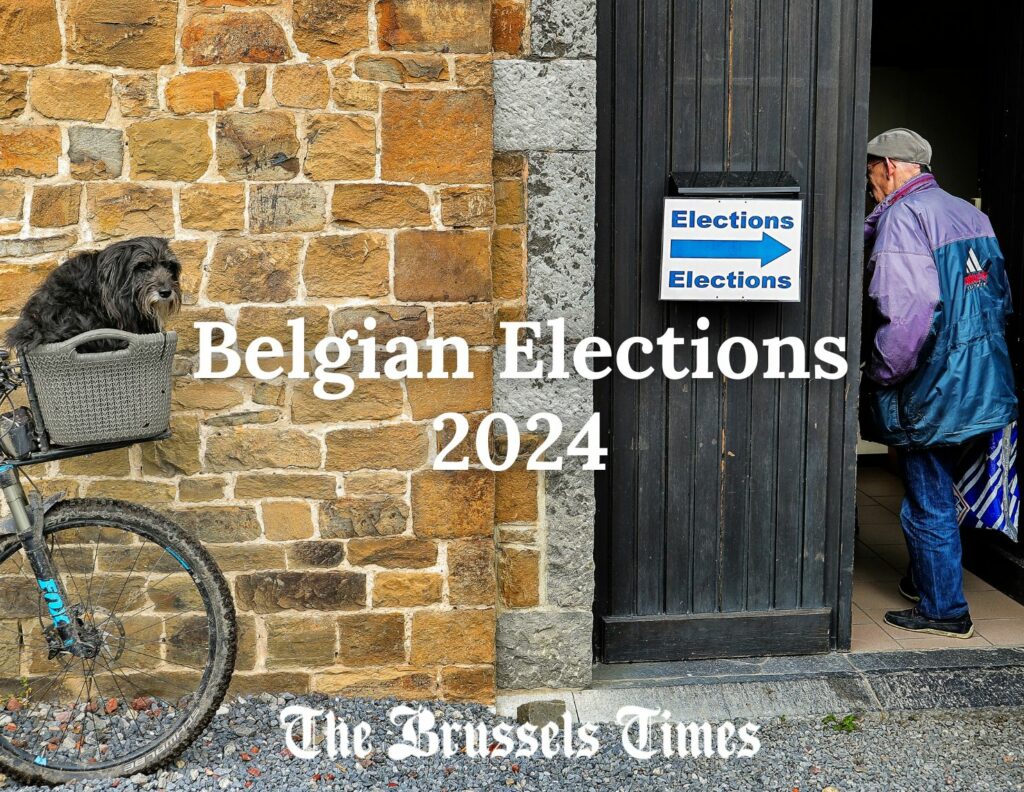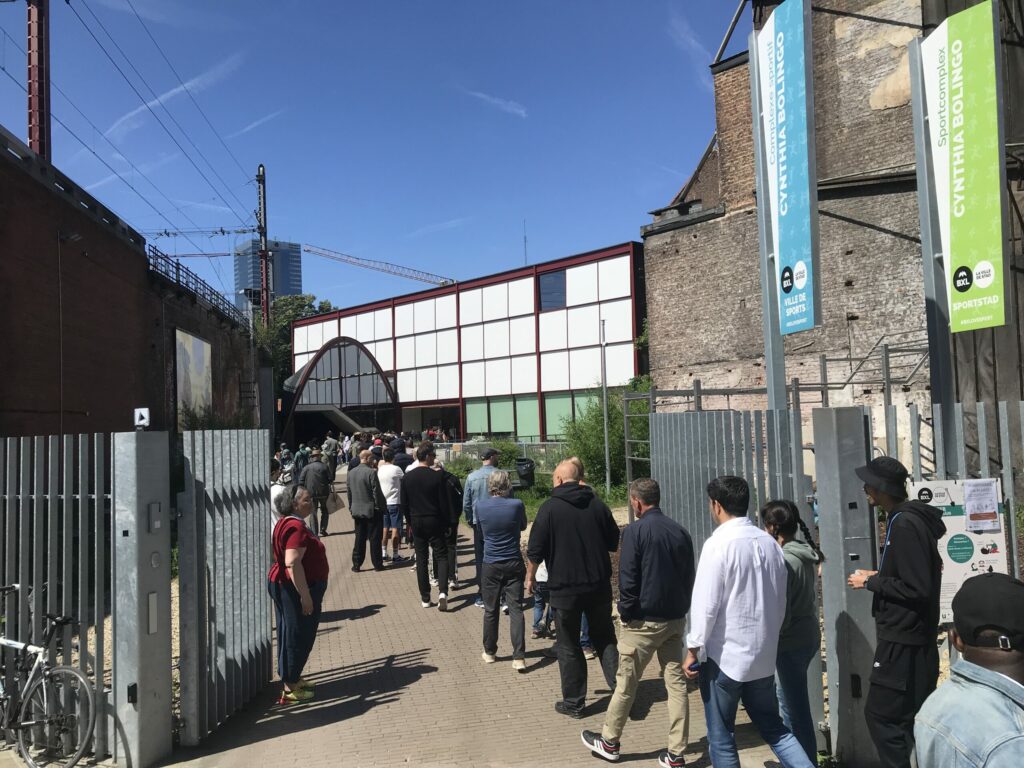This article covers the developments of Sunday 9 June. The latest updates on Monday 10 June can be found here.
Read back for the election highlights as they happened on the day (Sunday 9 June). The latest updates appear highest on the page.
Good evening from Brussels! Polling stations have now closed in Belgium and election results are coming through. As votes are counted, the political parties are now meeting to give post-election speeches. The Brussels Times brings you the latest updates and news, while our reporters are on the ground to gauge public opinion.
More than 8.35 million people in Belgium were called to polling stations on Sunday 9 June, casting votes in the federal, regional and European elections. To the uninitiated, the process can seem complex. Among the voters were 244,000 16- and 17-year-olds, who could vote for the first time in the European elections. Voting for the European elections kicked off on Thursday, and Sunday marked the final voting day.
[00:42] – Nearly all votes counted
As the results are almost complete, we are wrapping up today's election liveblog. Thanks for following everything at The Brussels Times and have a good night. Coverage today was provided by Lauren Walker, Ciara Carolan, Ellen O'Regan, Ugo Realfonzo, Orlando Whitehead and Maïthé Chini. See you tomorrow!
[00:30] - Seats per political family
Belgium, National Parliament election:
96.6% of the vote counted Seats, per federal political family PS/Vooruit-S&D: 28 (-1) CD&V/LE-EPP: 27 (+10) MR/OVLD-RE: 26 N-VA-ECR: 24 (-1) VB-ID: 20(+2) ECOLO/Groen-G/EFA: 10 (-11) PTB PVDA-LEFT: 14 (+2) DéFI-*: 1 (-1) +/- vs. 2019… pic.twitter.com/AZ1i7qc9jw — Europe Elects (@EuropeElects) June 9, 2024
[00:10] - Second European Parliament projection confirms win for EPP
As the last polling boxes were closed in Italy at 23:00, a second seat projection has been published for the composition of the next European Parliament.This time the projection includes the first provisional results from 17 EU Member States.
For other Member States the seat projection is still using national estimates, based on available exit polls, estimations or similar non-official data.
The latest projection confirms again that the European People’s Party (EPP) will remain the largest party in the European Parliament, support for the Greens/EFA has waned, and Europe’s far right parties have seen a lift in support (albeit not as significant a surge as some may have expected).
Of the 720 seats available, it is expected that the EPP will remain the largest party in the Parliament with 189 seats (26.25%), followed by the Socialists and Democrats with 135 seats (18.75%), and Renew Europe with 80 seats (11.11%), both retaining their positions as second and third largest political groups respectively.
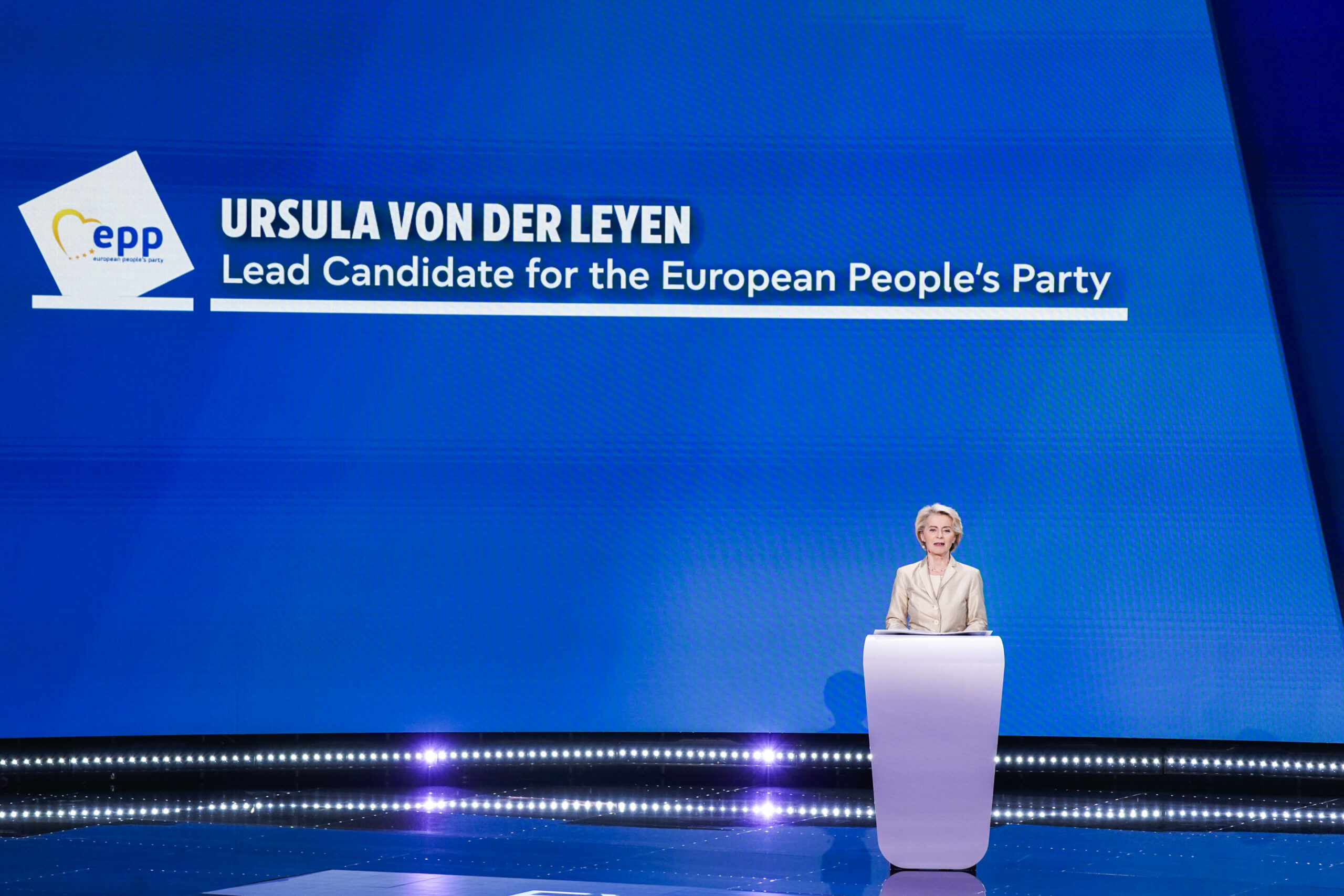
Von der Leyen addresses reporters. European Elections Night 2024. Credit: EP Photo
Europe’s two far right parties have surpassed the Greens/EFA group in size, as the European Conservatives and Reformists Group are projected to take 72 seats (10.00%), while the Identity and Democracy group are projected to win 58 seats (8.06%).
Meanwhile the Greens/EFA are expected to win 52 seats (7.22%), and The Left are projected to take 36 seats (5.00%).
Among members not affiliated with a political group, it is projected that there will be 46 seats for re-elected members and 52 seats for new members.
The European Parliament will continue to publish updated seat projections until around 01:00, as more polling data rolls in from Member States.
[23:54] - PS overtakes MR in Hainaut
The PS has overtaken the MR in first place for the Hainaut constituency (Wallonia) in the Chamber of Representatives elections, according to results published by the SPF Interior, having counted 74% of the 525 polling stations.
The PS, led by Charleroi mayor Paul Magnette, leads by 27.3% despite losing 6.94 points, while rival Georges-Louis Bouchez's MR follows closely with 26.93% after a rise of 10.98 points. As votes from Charleroi start to be counted, the PS is set to send six Hainaut deputies to the Chamber, compared to the MR's five.
[23:34] - European elections results Belgium are in
Vlaams Belang, N-VA and MR win most votes and will get 3 each MEPs each. Both Flemish nationalist parties have not gained any MEPs from 2019, while MR gained 1.
Former Belgian Prime Minister Sophie Wilmès leads the MR party, drawing more than 320,000 votes, boosting their delegate count to three, with Olivier Chastel and Benoît Cassart also elected.
PTB-PVDA will have 2 MEPs (one from the French-speaking list and one from the Dutch-speaking list), gaining one. PS, Vooruit, and CD&V will all get two MEPs. Green parties Ecolo and Groen as well as Les Engagés and Open VLD will all get 1.
MR have gained an MEP from Ecolo, who will maintain only their lead candidate, Saskia Bricmont.
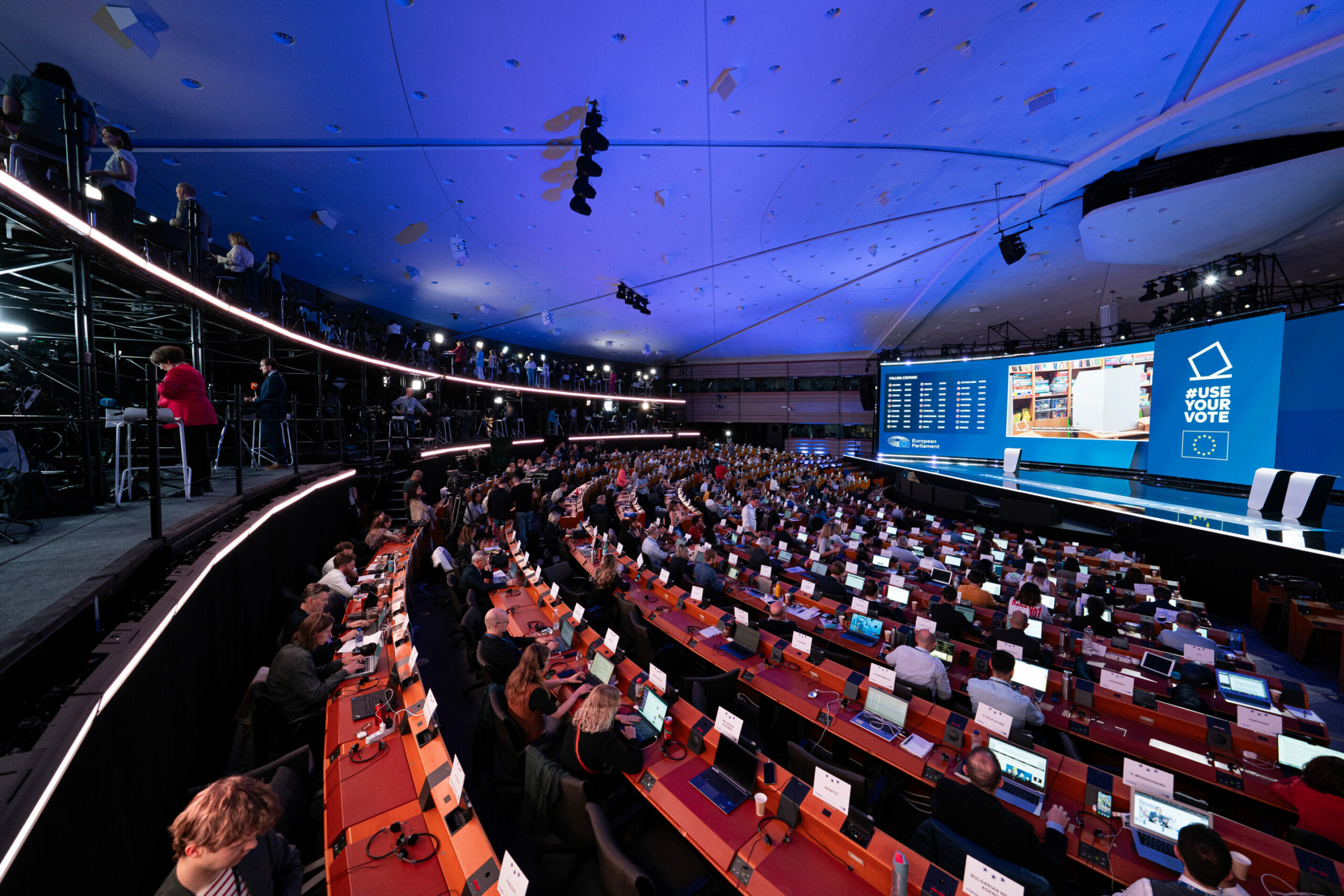
Big election night in the EP with many reporters. Credit: EP Photo
[23:17] - Seat projection per party (95% votes counted)
We have hit the 12th hour of our marathon live coverage of the Belgian elections.
Here is the projection of seats won in the Federal Chamber of Representatives per party, as things stand after 95% vote.
N-VA - 24 seats (-1)
Vlaams Belang - 20 seats (+2)
MR - 19 seats (+5)
PS - 16 seats (-4)
Les Engages - 15 seats (-)
PTB-PVDA - 14 seats (-)
CD&V - 12 seats (-)
Vooruit - 12 seats (-)
Groen - 6 seats (-2)
Ecolo - 4 seats (-9)
DéFi - 1 seat (-1)
[22:59] - MR leader Bouchez reacts: 'Historic moment'
Liberal Francophone party Mouvement Réformateur (MR) have pulled off a decisive victory in both Brussels and Wallonia (26.1% and 29.8% of the respective votes so far). Party leader Georges-Louis Bouchez has dubbed the election result a "historic moment".
"Never before has MR been able to take first place in a regional election in French-speaking Belgium," he said. Both of the regional victories mean that MR now has "a duty to implement our programme and to create the coalition that will enable us to carry out the reforms that the people of Brussels and Wallonia are asking of us," Bouchez stated. He will begin the process of forming a coalition from Monday. "There is not a minute to lose."
[22:55] – Mixed feelings among Belgian greens
"Difficult day for environmental movement," says French-speaking green co-leader Jean-Marc Nollet for Ecolo. Preliminary results indicated a significant loss for Ecolo in Wallonia and Brussels. The party recorded 7.5% of the vote for the Walloon Parliament, nearly half of their 2019 result. In Brussels, the party's support almost halved to 10%.
Groen party leader and current Brussels Mobility Minister, Elke Van den Brandt, responded positively to the provisional results showing Groen's increase by more than three percentage points from five years ago in the Brussels regional elections, claiming nearly 24% of the votes of the Dutch-speaking electoral college.
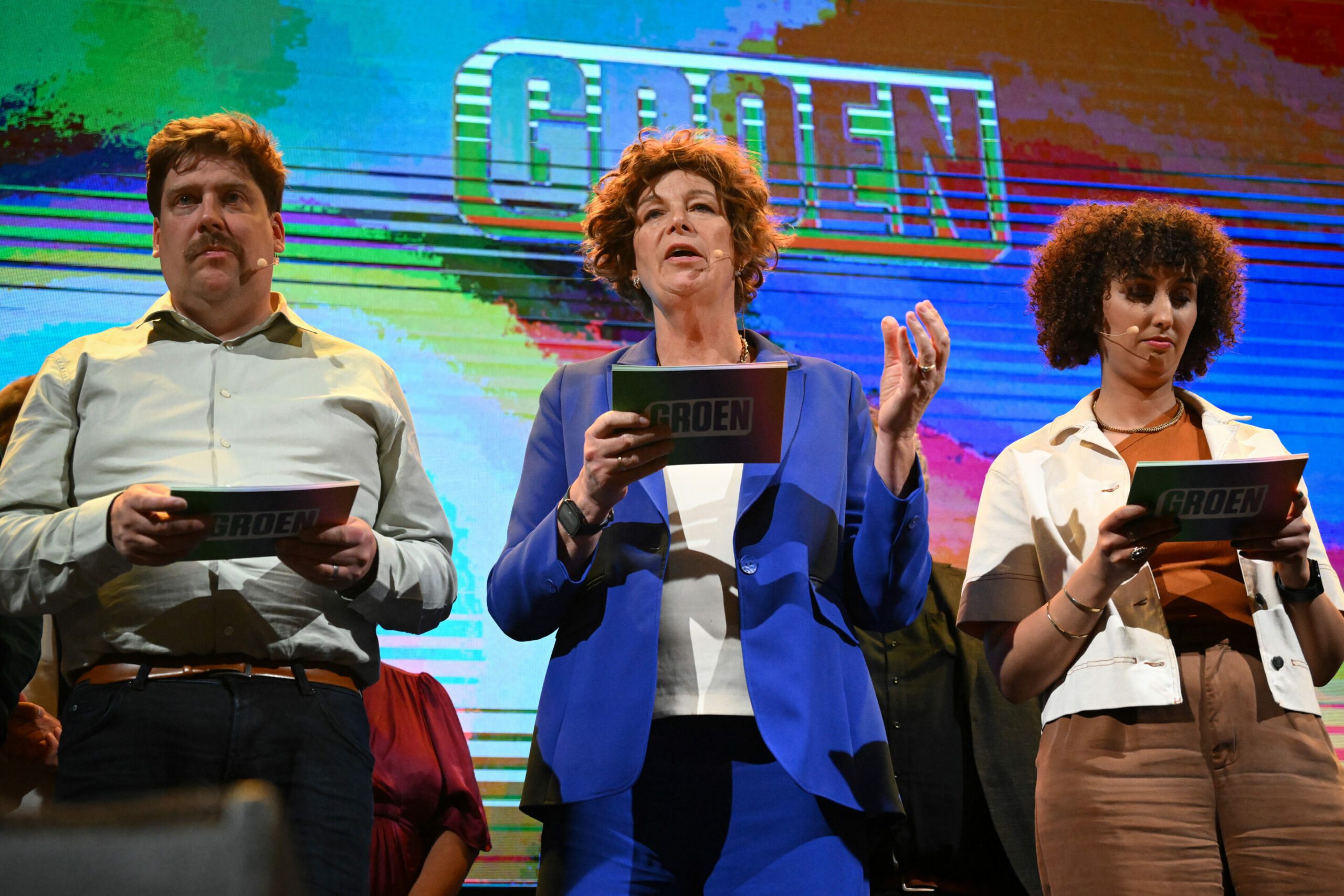
Groen's co-leader Jeremie Vaneeckhout, Minister Petra De Sutter and Groen co-leader Nadia Naji pictured at the post-election meeting of Flemish and French-speaking ecologist parties Groen and Ecolo, in Brussels, Sunday 09 June 2024. Credit: Belga / David Stockman
"These results are very encouraging; we're seeing growth," stated the Green party candidate on Dutch-language media outlet Bruzz. "Our city's quality of life has improved and we are being recognised for this."The minister believes Groen's success demonstrates citizens' clear endorsement of their vision for a more liveable city with better mobility and cleaner air."
The provisional results, granting Groen an extra seat - now five in total - in the Brussels Parliament, means that they could take on the role of forming a majority in the Dutch-speaking constituency.
[22:32] – Over 80% of votes counted in Walloon elections, MR confirms its strong position
The results from 82% of the polling stations in Wallonia were known at around 22:00 on Sunday: MR is still well ahead, with 29.9% of the votes – up 8.5 percentage points.
The PS and Les Engagés are neck-and-neck for second place. According to these results, which are still partial, the Socialist Party is just ahead, with 22.67%, compared with 21.42% for Les Engagés. Behind, PTB-PVDA is at 11.58% and Ecolo fell to 7.17%. DéFi now has just 2.68% of the vote.
At least half the polling stations in each constituency have been counted. If these partial results were confirmed, this would give 26 seats for the MR (+6), 19 for the PS (-4), 17 for Les Engagés (+7), 8 for the PTB (-2) and 5 for Ecolo (-7).
[22:17] – Centre right MEPs projected to surpass far right in Poland
National estimates have been published for another four EU Member States: Poland, Portugal, Romania and Sweden. The estimates show how many seats are expected to be won by each European political group, and are based on available exit polls, estimations or similar non-official data published by Member States.
Poland (53 seats total): European People’s Party (20), European Conservatives and Reformists (19), newly elected members not allied to any existing political group (9), Renew Europe (3), Socialists and Democrats (2).
Projections show the centre right EPP jumping from 16 to 20 seats among Polish MEPs, while far-right ECR is projected to fall from 27 to 19.
Portugal (21 seats total): European People’s Party (7), Socialists and Democrats (7), Renew Europe (2), The Left (2), Identity and Democracy (2), Greens/EFA (1).
Romania (33 seats total): Socialists and Democrats (13), European People’s Party (12), newly elected members not allied to an existing political group (5), Renew Europe (2), European Conservatives and Reformists (1).
Sweden (21 seats total): European People’s Party (5), Socialists and Democrats (5), Renew Europe (3), Greens/EFA (3), European Conservatives and Reformists (3), The Left (2).
[22:06] – Voter turnout for European election estimated at 51%
Some 51% of Europeans of voting age turned out to vote in the European elections that ended on Sunday, according to an estimate released by the European Parliament. In Italy, the polling stations are still open until 23:00, meaning the numbers could still go up slightly.
If confirmed, this turnout would be a slight increase on the previous elections in 2019, when 50.6% of Europeans voted. This was an increase of eight percentage points compared to 2014 and the first increase in 40 years.
[22:04] – First seat projection for the Federal Parliament
According to the first official forecast of seats in the Federal Parliament, Flemish rightwing N-VA is predicted to have 24 seats (one fewer than in 2019). Close on their heels are the Francophone liberal MR party with 22 seats (an increase of 8 seats).
The party with the third-most seats is the Flemish far-right Vlaams Belang with 20 (up 2 from last year). In fourth place are the Francophone centrist Les Engagés (15 seats, same as in 2019), followed by radical left PTB-PVDA (14 seats, unchanged from last time) in fifth and Francophone socialist PS (13 seats) in sixth.
With 12 seats are Flemish socialist Vooruit and Christian-Democrats CD&V, both with the same number of seats as in 2019. Flemish liberal Open VLD lost big and are stranding at just seven seats (down five from 12 before).
Trailing at the bottom are the Flemish environmentalists with six seats (down two) and the Francophone greens Ecolo (four seats, down nine) and centrist DéFi with one seat (down one).
[21:45] – Vlaams Belang urges N-VA 'not to miss this historic opportunity'
Vlaams Belang leader Tom Van Grieken has called on N-VA leader Bart de Wever "not to miss this historic opportunity," encouraging the victorious right-wing N-VA party to consider its extremist counterparts Vlaams Belang as allies in a governing coalition of Flanders.
Results are not final but N-VA is leading with 24.4% of votes while Vlaams Belang comes in second with 22.7%. The latter had been predicted to come out on top, and Van Grieken concedes that the party "did not succeed" in its ambitions. He congratulated De Wever on his party’s success, noting that Flanders was voting more right-wing than ever before. "Flanders has spoken very clearly."
[21:39] – ULB apologises for incorrect Wallonia exit poll
ULB political science professor Pascal De Wit took to social media to admit to a coding error in the ULB exit polls for Wallonia, which projected that PTB-PVDA would be on top in Wallonia, with some 24%.
"We unfortunately made an encoding error by reversing Les Engagés and PTB-PVDA, and vice versa," De Wit said. "We were pressed for time. We apologise."
That means that MR, Les Engagés and the PS will be in a range between 19% and 23.5%, with a tight gap between the three. Meanwhile, PTB-PTVA would be around 14.5-15%, and Ecolo at 8%
Bonjour, Pour le sondage Sortie des urnes en Wallonie, nous avons malheureusement commis une erreur d'encodage en inversant Engagés et PTB et inversement. Nous étions à flux tendu. Nous présentons nos excuses.
— Pascal Delwit (@PDelwit) June 9, 2024
[21:28] – Tom Ongena quits as leader of Open VLD
Following Open VLD's defeat in the polls, Tom Ongena (48) quit as the party's leader, he announced on Sunday at the party headquarters. The party leadership will meet tomorrow/Monday to discuss the issue.
Ongena headed the Flemish list of the Open VLD in the province of Antwerp. After the 2019 elections, he entered the Flemish Parliament as Bart Somers' successor, but had to hand that seat back to Somers towards the end of the legislature, when the latter stepped down as Flemish minister.
Ongena has only been party president since last year, succeeding Egbert Lachaert who stepped down following internal issues in the party.
[21:21] – MR winning in Wallonia, gap between Les Engagés and PS narrows
In Wallonia at 21:00 on Sunday, votes in over half the polling stations have been counted for the Walloon Parliament elections. It is clear that MR is winning the ballot (30,40%), but behind it, the gap between Les Engagés and PS is narrowing.
With 786 out of 1,374 polling stations counted, the liberal party MR stands at 30.4%, 9 percentage points higher than in 2019. As it stands, Les Engagés is becoming the second party for now, with 22.3% of the votes counted – almost double the result of the previous election.
The PS party follows with 21.7% (-4.6 percentage points), but the gap with Les Engagés does seem to be narrowing compared to earlier figures Sunday night. The third party according to the preliminary results is PVDA-PTB (10.9%), ahead of Ecolo (7.6%) and DéFI (2.7%).
BREAKING: Macron calls for snap elections in France after major defeat
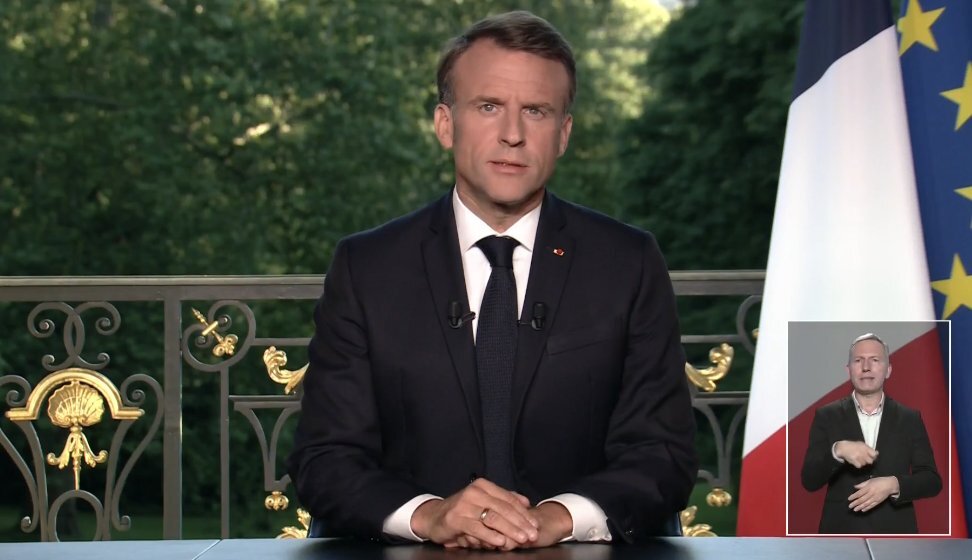
French President Emmanuel Macron. Credit: Screenshot of broadcast
In a shock development of the day, French President Emmanuel Macron has dissolved the National Assembly and called for snap elections in France, to be held sometime between 30 June and 7 July.
Far-right National Rally has won 31,5% while Macron’s Renaissance came in second but with 15,2%, according to Ipsos / France Televisions at 20:00
[21:15] – Far-right MEPs see surge in support in France
Back in the European Parliament, national estimates have been published for three more Member States, Denmark, France and Spain, predicting how many seats are expected to be won by each European political group.
National estimates are based on available exit polls, estimations or similar non-official data published by Member States.
Denmark (15 seats total): Renew Europe (4), Greens/EFA (3), Socialists and Democrats (3), European People’s Party (2), The Left (1), Identity and Democracy (1), and newly elected members without an alliance to an existing group (1).
France (81 seats total): Identity and Democracy (30), Renew Europe (14), Socialists and Democrats (13), The Left (8), European People’s Party (6), Greens/EFA (5), European Conservatives and Reformists (5).
Spain (61 seats total): European People’s Party (22), Socialists and Democrats (20), European Conservatives and Reformists (7), Greens/EFA (4), The Left (3), new members without an alliance to an existing political group (3), re-elected members without an alliance to a political group (1), Renew Europe (1).
[21:06] – 'Best-ever result' for PTB-PBDA, Open VLD 'will be back,' N-VA 'won these elections'
The leader of the Belgian Worker’s Party (PTB-PVDA) Raoul Hedebouw made a speech celebrating the party’s "best-ever result" to a jovial crowd at La Madeleine on Sunday evening. The party is awaiting results from Wallonia but has so far made significant gains in the Brussels-Capital Region and Flanders.
"PTB-PVDA has come out as a big winner in Brussels and Flanders," he told the cheering crowd. "We have consolidated our position and are gaining ground in the whole country. This is our best-ever result."
Hedebouw said the party was on track to be the largest in the federal parliament and highlighted the fact that PTB-PVDA is the only party to span all three regions in Belgium. "PTB-PVDA is the voice of national unity," he said. The room was filled with chants of "we zijn één, nous sommes un" ("we are one").
Meanwhile, Prime Minister Alexander De Croo (Open VLD) told party members he would be resigning on Monday. The Flemish liberals, which lead the outgoing Vivaldi government, have suffered losses in both Flanders and Brussels. De Croo congratulated "the winners of these elections," namely N-VA, Vlaams Belang and Vooruit. "The liberals are resilient," he said. "We will be back stronger than ever."
N-VA party leader Bart De Wever has also made a speech to an even more gleeful crowd. N-VA has performed decidedly well. "We have won these elections," said De Wever in spite of weak polling and "destructive" comments in the media. "Our death notice was written but you did not give up. N-VA is the leading popular party in Flanders."
De Wever said that the people of Flanders had voted for prosperity and autonomy. He noted that while Wallonia was awaiting results, it was "clear" that the Francophone region was just as dissatisfied with the Vivaldi government. In the right-wing separatist politician’s view, "self-determination is the best choice."
[20:50] – European elections: First seat projection
The European Parliament has published its first projection for how many seats each EU political group is expected to win. It indicates losses for the Greens/EFA while Europe’s far-right parties have made gains, though not as great a surge as some were expecting.
Of the 720 seats, it is expected that the European People’s Party will remain the largest party with 181 seats (25.14%). They are followed by the Socialists and Democrats with 135 seats (18.75%), and Renew Europe with 82 seats (11.39%) – both retaining their positions as second and third largest political groups, respectively.
However, Europe’s two far-right parties have surpassed the Greens/EFA group. The European Conservatives and Reformists Group are projected to take 71 seats (9.86%), while the Identity and Democracy group are projected to win 62 seats (8.61%). The Greens/EFA are expected to win 53 seats (7.36%) and The Left are projected to take 34 seats (4.72%).
For MEPs not affiliated with a political group, it is projected that 51 seats apiece will be won by re-elected members and new members (7.08% each).
The projection compiles available election results, estimates or polling data published in the Member States.
NEW - #EUElection2024 first seat projection for new EP
Estimated composition of the new European Parliament based on estimates in 11 countries (🇦🇹, 🇧🇬, 🇭🇷, 🇨🇾, 🇩🇰, 🇫🇷, 🇩🇪, 🇬🇷, 🇲🇹, 🇳🇱, 🇪🇸) and pre-electoral data for the remaining 16 countries. Details: https://t.co/kRi1wgPKKT pic.twitter.com/tm7UcUo23E — EP PressService (@EuroParlPress) June 9, 2024
[20:40] – City of Brussels Mayor Philippe Close: "PS is far from collapsing"
The City of Brussels Mayor Phillipe Close has reacted to the first results, that so far show gains for MR at the expense of Close's Socialist Party (PS). "I think that left-wing ideas are making headway in the Brussels region. Let's wait for all the results before drawing any big conclusions. But I repeat, the PS is far from collapsing," he told BX1 on Sunday evening.
[20:25] – One-third of votes in Wallonia counted
A third of polling stations in Wallonia (33.5%) have now counted their votes, compared with over 81% in Flanders, where most voting happens electronically.
Unlike in the north of the country, Wallonia does not use electronic voting (except in the municipalities of the German-speaking Community). 460 of the 1,374 Walloon polling stations have now been counted. Preliminary results show that MR would become the largest party in the Walloon Parliament, securing over 31% of the vote – an increase of almost 10 percentage points compared to the 2019 elections. Les Engagés are currently second with over 23% of the counted vote; the PS currently has around 21% of the counted vote.
[20:17] – First results from Wallonia: MR ahead, PS third
The first Walloon canton to report complete results sees liberal MR in the lead too for the Walloon Parliament in the Houffalize canton, Luxembourg province.
The liberals received 36.89% of the votes, increasing by 13.36 percentage points versus 2019. They were followed by Les Engagés, securing 31.78% of votes - a rise of 3.3 percentage points. The Socialist Party (PS) ranked third, acquiring 17.75% of votes, an increase of 1.32 percentage points. However, the Green party (Ecolo) lost 5.64 percentage points, earning a mere 6.70% of the votes.
In the same province, complete results from the Wellin canton revealed a similar trend.
[20:15] – N-VA remains largest in Flemish elections, Vlaams Belang second
For the Flemish regional parliament, N-VA remains the largest party with 25% now that over 80% of the votes have been counted.
Contrary to what the opinion polls before the elections suggested, the party is keeping ahead of Vlaams Belang. Still, Vlaams Belang is climbing 3.5 percentage points to reach 22%. The big losers are Open VLD and CD&V.
This means that it is not Vlaams Belang, but N-VA that will likely get the right of initiative to form a Flemish Government. According to a preliminary prognosis by political scientist Stefaan Walgrave, N-VA would remain the largest group with 32 seats – one seat more than Vlaams Belang (31 seats). This would give both parties a narrow – but not a workable – majority.
Vooruit would become the third largest party. They are gaining 3.3 percentage points to reach 13.4%. PTB-PVDA is also making a solid jump, and gaining almost 4 percentage point – comes out at 9.2%. In seats, the party would end up at 10 seats, a gain of 6 seats.
If the cordon sanitaire is maintained, political scientist Stefaan Walgrave predicts a coalition between N-VA, Vooruit and CD&V at the Flemish level. "This is the most plausible. In any case, Bart De Wever will be unavoidable."
The biggest loss is seemingly for the Flemish liberal Open VLD, which is falling 5.3 percentage points to 7.8%. CD&V also loses ground and dropped 3 percentage points to 12.4%. Groen, too, is losing ground and dropping to 7.4% (-2.7 percentage points).
No other party reaches the electoral threshold. Els Ampe's party Voor U, for instance, remains stuck at 1%.
[19:52] – Belgium's European election results not expected until 23:00
The European election results for Belgium are not allowed to be published until after 23:00. The European Parliament is expecting the first provisional results for Belgium at 00:15.
[19:45] – European elections: How is the situation in the rest of the EU?
The European Parliament has published the first national estimates for MEPs elected across eight Member States: Austria, Bulgaria, Croatia, Cyprus, Greece, Germany, Malta and The Netherlands.
National estimates are based on available exit polls, estimations or similar non-official data published by Member States. Below are the initial estimates of how many seats will be won by each European political group.
Austria (20 seats total): Identity and Democracy (6), European People’s Party (5), Socialists and Democrats (5), Renew Europe (2) and the Greens/EFA (2).
Bulgaria (17 seats total): European People’s Party (6), Renew Europe (5), newly elected members not allied with any existing group (4) and Socialists and Democrats (2).
Croatia (12 seats total): European People’s Party (6), Socialists and Democrats (4), Greens/EFA (1) and newly elected members not allied to any existing group (1).
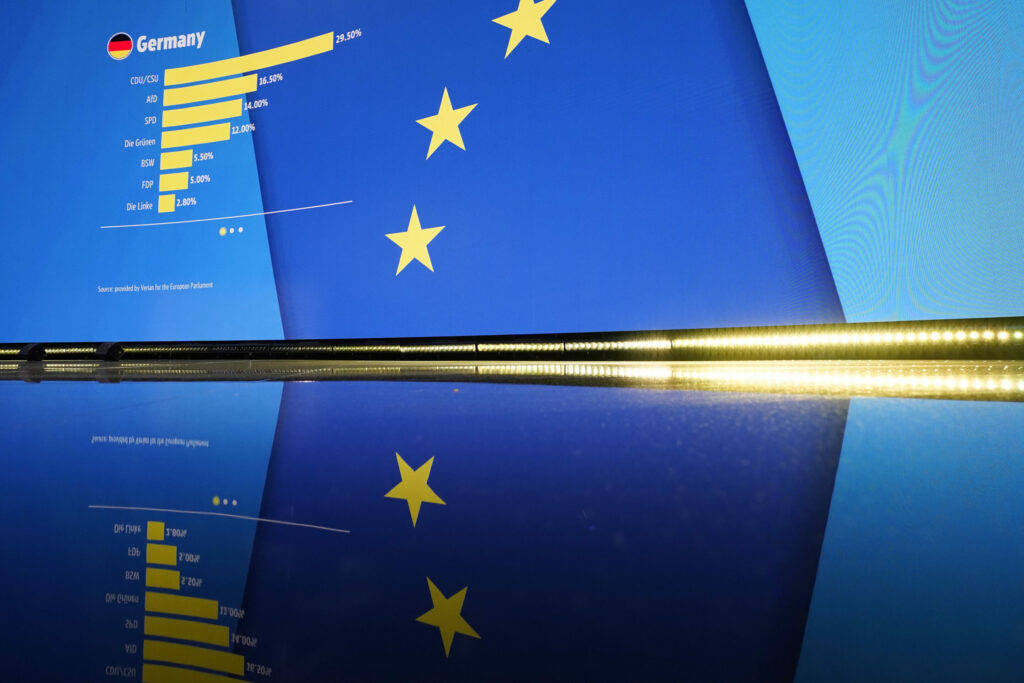
Elections Night 2024 in the European Parliament in Brussels. Credit EP Photo
Cyprus (6 seats total): European People’s Party (2), newly elected members not allied to any group (2), Socialists and Democrats (1), The Left (1).
Greece (21 seats total): European People’s Party (8), The Left (4), Socialists and Democrats (3), European Conservatives and Reformists (2), re-elected members not attached to any group (2), and newly elected members not allied to any existing group (2).
Germany (96 seats total): European People’s Party (30), re-elected members not attached to any group (19), Greens/EFA (16), Socialists and Democrats (14), Renew Europe (8), The Left (4) and newly elected members not allied to any existing group (5).
Malta (6 seats total): European People’s Party (3), Socialists and Democrats (3).
The Netherlands (31 seats total): Identity and Democracy (7), Renew Europe (7), European People’s Party (6), Greens/EFA (4), Socialists and Democrats (4), The Left (1), European Conservatives and Reformists (1) and newly elected members not allied to any existing group (1).
[19:28] – Vlaams Belang leader gets almost twice as many votes as Flemish Minister-President
Vlaams Belang president Tom Van Grieken received almost twice as many votes as the current Minister-President of the Flemish government, Jan Jambon, in the elections for the Flemish parliament in the province of Antwerp, according to official (partial) results.
[19:26] – Over half of votes counted in Brussels, MR expected to win
The Francophone liberal MR is extending its leadership in the Brussels regional elections, according to results released by the Ministry of Interior following the counting of over half the votes in the capital, with socialist Francophone PS identified as the main challenger, ahead of radical left PTB.
MR secured 27.35% of votes, following a count from 412 of 728 polling stations, marking nearly an 11% increase from 2019. PS came second with 20.82% of the votes, slightly down by just over 1% compared to five years ago. Meanwhile, PTB, in third place, saw a surge of almost 6%, reaching 19.54% of the vote.
Francophone environmentalist Ecolo suffered a sharp decline of more than 8% from its results five years ago, scoring 10.86%. This put them narrowly ahead of centrist Les Engagés, who received 10.50% of the vote, an improvement of 3% since 2019. Regionalist DéFI followed with 8.43%, a loss of 5% compared to their previous result.
Among Dutch-speaking voters, political preferences displayed significant variation. Environmentalist Groen solidified its lead with 24.72% of the vote, a 4% increase in five years. The pro-Palestine party Team Fouad Ahidar, a former Flemish socialist elected official, surprisingly came second, with just over 13% of the votes.
They were followed by N-VA (12.51%) who lost 5% from 2019, the Open VLD (11.31%, a loss of 4.4%) and Vlaams Belang (10.51%, an increase of 2.2%).
It is noteworthy that less than a quarter of votes have been counted in the eastern districts of Brussels and the district of Saint-Josse-ten-Noode, which also includes the two Woluwes and Etterbeek.
[19:16] – N-VA unlikely to meet electoral threshold in Wallonia
The Flemish rightwing N-VA does not seem likely to reach the 5% electoral threshold needed for the Federal Parliament in any Walloon province, partial results are suggesting.
N-VA leader Bart De Wever is currently performing best in the provinces of Walloon Brabant and Liège. With about a fifth of polling stations counted each time, it stands at around 3.2 % in both constituencies.
In Luxembourg, with 32% of votes counted, N-VA comes out at 2.7%. In Hainaut, it is 2.6% (but with only 8% of polling stations counted) and in Namur 1.7%.
[19:05] – MR wins in Brussels, PS remains narrowly ahead of PTB
With over 40% of votes counted, the Francophone liberal MR leads quite comfortably in Brussels for the regional elections with 27.75% – a gain of over 10 percentage points from five years ago.
The socialist PS is narrowly second with 20.60% – 1.30 percentage points better than the radical left PVDA-PTB, which has consistently outperformed the French-speaking Socialists in the polls.
The Francophone environmentalists Ecolo lose more than 8% and is stranded at 10.77%, a sigh more than Les Engagés (10.64%). DéFI still retains 8.45%.
[18:35] – Over half of Flemish votes counted, N-VA in the lead
The first official results for the Flemish Parliament have been published by the Interior Affairs Ministry website.
With just over half of the votes (55%) in the polling stations in the north of the country, the rightwing N-VA maintains its first place at 25% with a very slight increase, while the far-right Vlaams Belang gains more than three percentage points but remains behind at 22%.
The Flemish socialist Vooruit (at 13.5%) and radical left PTB-PVDA (at 8.95%) are gaining ground, while CD&V (12.6%), Groen (7.4%) and Open VLD (7.8%) are losing votes.
[18:26] – First official results are in from German-speaking Community
Now that all polling stations across Belgium have closed, the first results coming in are from the German-speaking Community, where the regionalist centre-right ProDG is the leading party.
With 36 out of 57 polling stations counted, the regionalist ProDG party of outgoing Minister-President Oliver Paasch came out on top with 28.16% of the vote – an increase of more than 4 percentage points compared with 2019.
It is ahead of the Christian Democrats of the CSP (18.98%), the Socialists of the SP (15.60%), the Liberals of the PFF-MR (13.37%), Vivant (11.80%) and Ecolo (9.92%).
[18:12] – Official results coming in soon via Interior Affairs Ministry
Now that the very last polling stations have also closed in Woluwe-Saint-Lambert, a large number of official results are expected to be coming in via the Interior Affairs Ministry website.
[18:07] – Exit poll puts PTB-PVDA on top in Wallonia
An exit poll conducted by Brussels university ULB, commissioned by RTL, shows the radical left PTB-PVDA as the largest party in Wallonia. As a duel between the liberal MR and socialist PS was expected, this result came as a surprise for many.
Additionally, the main focus in the run-up to this election was on centrist Les Engagés, which was expected to come in third.
The poll – carried out among 6,000 voters as they left the polling station – shows that PTB-PVDA would end up at 24% in Wallonia. PS and MR would follow, each with around 21%. It seems as if Les Engagés will linger at 13%, while Ecolo would drop below 10%.
Political scientist Dave Sinardet (VUB) pointed out the importance of being "extremely" careful with exit polls, which like all polls have a margin of error. "Let's wait a bit more for the official results."
Volgens exit poll van ULB voor federale verkiezingen in Wallonië zou PTB de grootste partij worden met 24% (!). PS zou dalen naar 21,5, MR stabiel blijven op 20,7, Engagés stijgen naar 13, Ecolo dalen naar 9. Ook met exit polls moet echter zéér voorzichtig worden omgesprongen.
— Dave Sinardet (@DaveSinardet) June 9, 2024
[17:50] – Voor U considers complaint after reports on minors voting for Flemish and federal levels
The new political party Voor U of Els Ampe (former Open VLD) is considering filing a complaint with the Council for Electoral Disputes after several media reports about 16- and 17-year-olds who were reportedly able to vote not only for the European but also the Flemish and federal list.
"We are considering filing a complaint," Ampe confirmed to Belga News Agency. "We are asking for more information first."
[17:30] – Journalists asked to leave Open VLD headquarters
At the headquarters of the Flemish liberal Open VLD, journalists were asked to leave as the party wants to give the people inside "some peace and quiet," and make sure they are "not harassed by journalists," VRT reports.
The initial results that came out on Sunday afternoon do not bode well for Open VLD, and neither did the opinion polls before the elections took place. Several liberals said that they were somewhat apprehensive about the results. "We are bracing for impact," one liberal said.
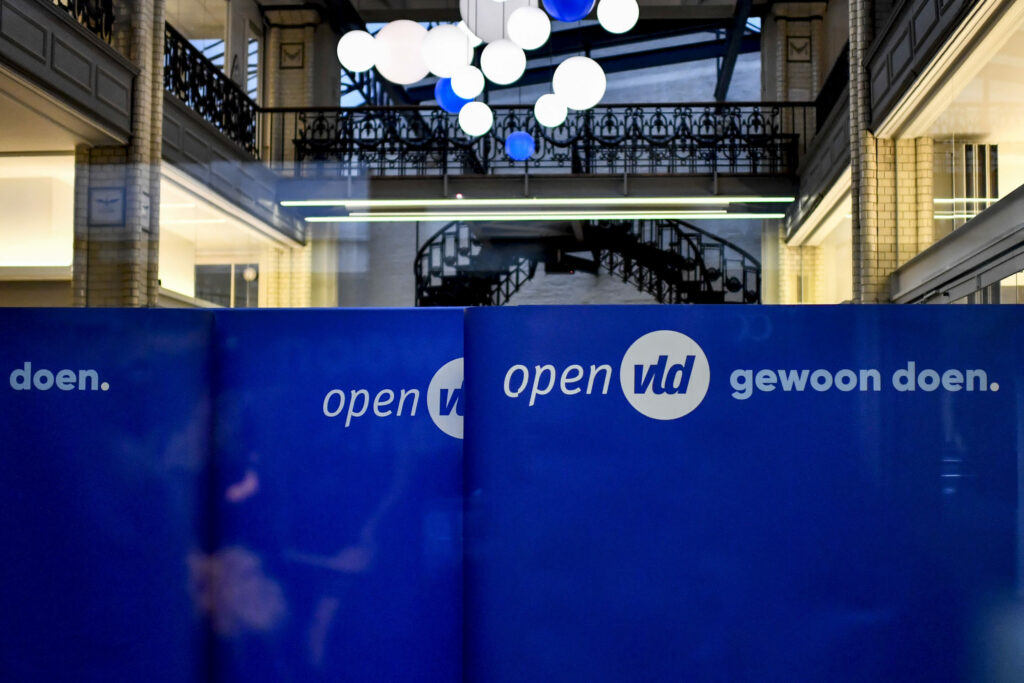
Open VLD headquarters. Credit: Belga/Dirk Waem
The votes that have already come out are far from final, so no conclusions can be drawn yet. "They will have to wait for what is to come, but the atmosphere at headquarters does not seem optimal in any case."
[17:02] – No official results until all polling stations close
Due to a number of delays, particularly in the Brussels municipality of Woluwe-Saint-Lambert, no official results will be released until all polling stations have closed – before 18:00. Any results released before that time will be either exit polls or very partial results from polling stations.
[16:58] – Water distributed to waiting voters in Woluwe-Saint-Lambert
The mayor of Woluwe-Saint-Lambert Olivier Maingain (DéFI) asked the Red Cross to distribute water to voters forced to wait to enter the polling booth at the Poséidon polling station. Hundreds of people queued there in the afternoon.
Several stations in the commune experienced breakdowns in their voting machines. As a result, the mayor decided to allow voters to vote until 18:00 in several polling stations that had experienced disruptions, if necessary.
[16:47] – Les Engagés leader attacked in Namur
After an attack on the Mayor of Saint-Gilles Jean Spinette (PS) on Saturday, the leader of Francophone centrist party Les Engagés Maxime Prevot has also been verbally attacked by a disgruntled citizen.
"When I arrived earlier, he had already uttered a few insults. He was obviously having a bit of trouble coping with alcohol. And showing a certain hostility towards politics," explained Prévot. The attack took place in the early afternoon, just as the mayor of Namur was posing with citizens in front of the Meuse.
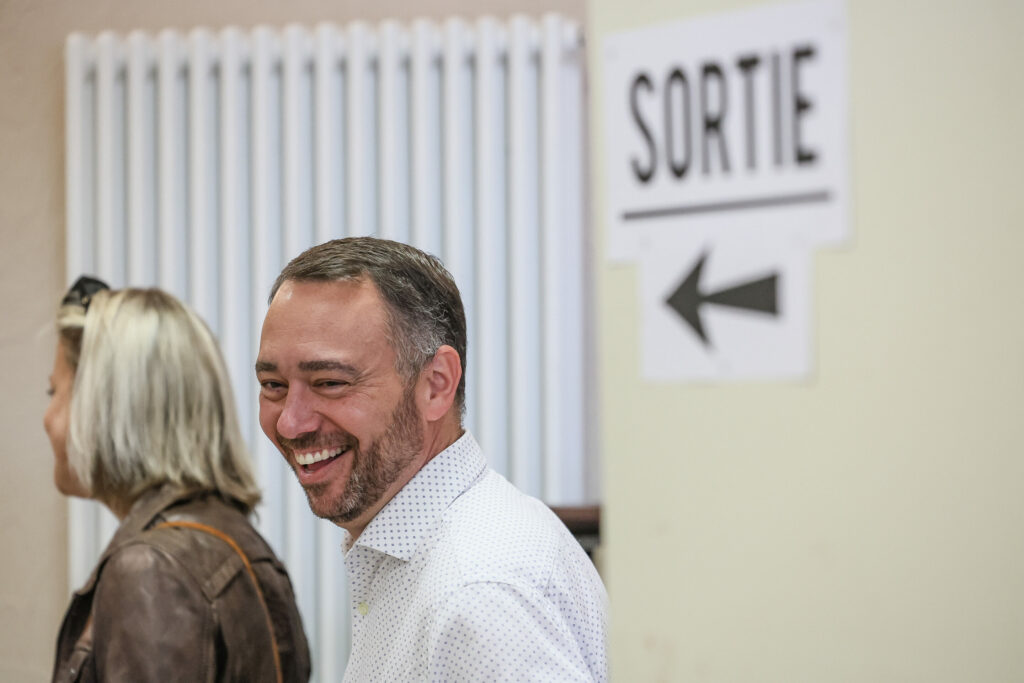
Les Engagés leader Maxime Prevot casts his vote at a polling station in Namur. Credit: Belga/Bruno Fahy
"He came up to me and started pushing me about two metres to make me fall. Fortunately, I was able to dodge him," reassured the president of Les Engagés, who regretted "this gratuitous act of aggression" against this "person who has a bit of a problem with alcohol management." However, we do not know the exact motives of the assailant.
[16:30] – Polling stations have closed, results start trickling in
After the paper polls at 14:00, the last electronic polling stations closed their doors at 16:00 on this election Sunday.
Any voters still in the queue at 16:00 are still allowed to cast their vote, meaning a number of polling stations will remain open a little later than planned, either because of technical problems or because of a large number of voters.
The mayor of Woluwe-Saint-Lambert, Olivier Maingain (DéFi), has therefore decided that polling stations in his municipality will remain open until 18:00. For now, it seems like other Brussels municipalities such as Ixelles, Molenbeek and Schaerbeek will not following Maingain's example.
Results will now start trickling in from across the country.
[16:18] – Expat in Brussels: 'Feeling cheated'
Robert (42) is an Austrian citizen who has lived in Belgium for ten years, but he did not vote in the Belgian federal elections nor for Belgian or Austrian candidates in the European elections.
"To be completely honest, I did not do the research out of laziness, and by the time I realised there was a deadline to register to vote for Austrian MEP candidates, I had already missed it," he told The Brussels Times. Up until now, he was unaware that he had the option to vote for Belgian MEP candidates.
He explains that his lack of motivation to vote was partly borne of "feeling cheated" during the European elections in 2019, when voters were "mistakenly" given the impression that they had a say in who would be appointed European Commission president (de facto leader of the EU) via the Spitzenkandidaten system. He expressed disappointment at Ursula von Der Leyen’s appointment (which effectively overrode the Spitzenkandidaten system) and said that this incident had impacted negatively on his desire to participate in European politics.
[16:06] – 'No structural problem with 16- and 17-year-olds,' says Interior Minister
According to Interior Affairs Minister Annelies Verlinden, there does not seem to be any structural problems with 16- and 17-year-olds who could vote for the time being, she told VRT on Sunday afternoon.
Belgium's 16-17-year-olds had to cast their votes for the European elections, but in some polling stations they reportedly were also able to vote for the Federal and the Flemish Parliament.
"No official reports have yet been received at the Interior Ministry," Verlinden said. "Organising elections of course always involves many people. It could be that a polling station chair gave a card to a 16-year-old for the three parliaments. There seem to be no structural problems today, though here and there media reports."
She also pointed out that the vote is secret, meaning it cannot be traced who cast which vote. The Interior Affairs Ministry cannot yet say whether the delays will have an impact on the publication of countrywide results.
[16:03] – Voting generally going smoothly in Brussels, turnout up in city centre
Interior Minister Annelies Verlinden (CD&V) confirmed that the National Crisis Centre has seen no systemic issues and long queues are just peak moments due to voter distribution.
Various Brussels mayors also reported few issues. While there were initial 'bugs' in the Anderlecht voting system, these were quickly resolved. Technical failure was reported in polling station 65 in the Woluwe-Saint-Lambert municipality, with Mayor Olivier Maingain (DéFI) indicating it is likely to persist. He advocates for the reintroduction of paper voting to alleviate technical issues.
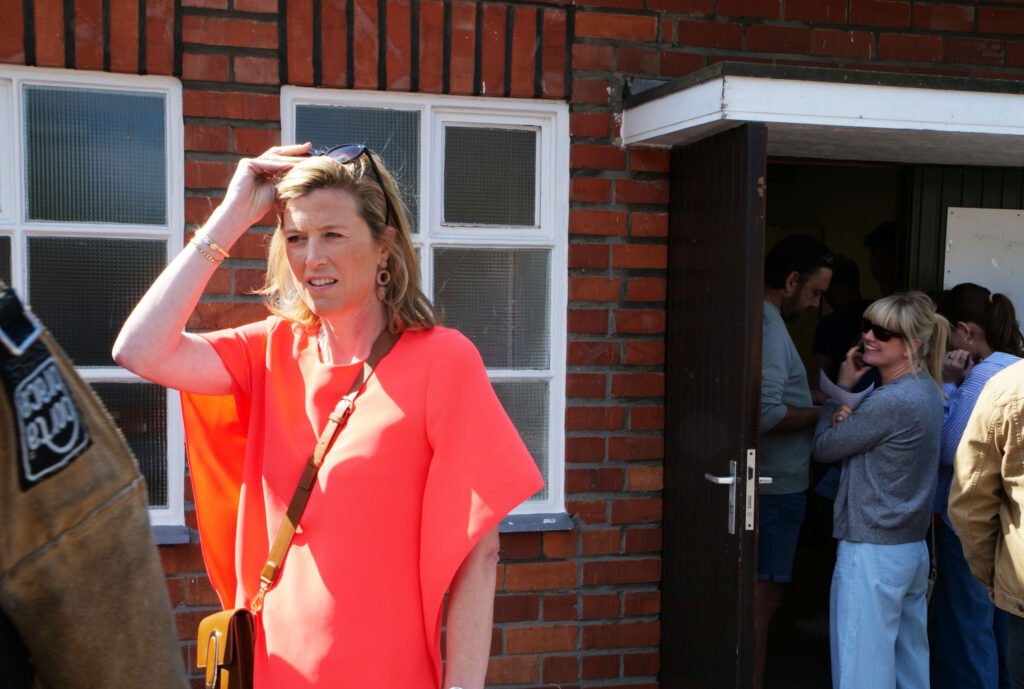
Interior Minister Annelies Verlinden pictured at a polling station in Schoten. Credit: Belga/Robbe Vandegehuchte
Brussels Mayor Philippe Close (PS) identified no technical issues in the City of Brussels municipality. However, voter turnout has increased due to the lowering of the voting age to 16 for European elections, and an increase in the Brussels population. A variable but overall long waiting time was observed in the Schaerbeek municipality, acting Mayor Cécile Jodogne (DéFI) attributes this to the simultaneity of three elections and some voters requiring voting assistance.
Ixelles Mayor Christos Doulkeridis (Ecolo) stated that voting was proceeding smoothly with a large team on hand to respond quickly. Doulkeridis added that, if necessary, polling station hours in his municipality could be extended to ensure all voters have the opportunity to vote
[16:00] – Polls closing now
Polling stations across Belgium are closing now. In Brussels, however, they will remain for a while longer so people who are still in the queue will be allowed to vote. In several municipalities, numerous people are still waiting in line to cast their vote.
[15:55] – 'Language incident' at Dilbeek polling station, mayor files complaint
In the same polling station in the Flemish municipality of Dilbeek (just outside of Brussels), where voters were previously addressed in French instead of Dutch on Sunday morning, the chair of the station again used French to give explanations, VRT reports and mayor Willy Segers confirmed to Belga News Agency. He will file a complaint with the justice of the peace court.
Segers received reports Sunday morning that French was spoken to voters in one polling station, while the language law states that it should be in the Flemish municipality. Due to its proximity to Brussels, however, many of Dilbeek's inhabitants speak French.
The full polling station, with four to five poll clerks, appeared to be using French. After the staff members were asked about it, they switched to Dutch – which they seemed to speak equally well. After that, everything went back to normal, the mayor said. A few hours later, however, Segers again received reports about the same polling station: the chair allegedly addressed voters in French again.
"When citizens brought that up, a discussion allegedly ensued, with the chair trying to provoke controversy. That is anything but what you should expect from a polling station employee," he said. "Apart from not respecting the language law, there is also a chance that he might influence the voting behaviour of citizens. That is not acceptable."
Segers will now file a complaint against the man with the peace court of the Asse canton, which is responsible for organising polling stations.
[15:39] – Those still queuing at 16:00 can still vote
Anyone who is still queuing at a polling station at 16:00 will still be able to vote, confirmed the Interior Affairs Ministry (which is in charge of running the elections). Several places in Brussels still have long queues in front of polling stations at 15:30.
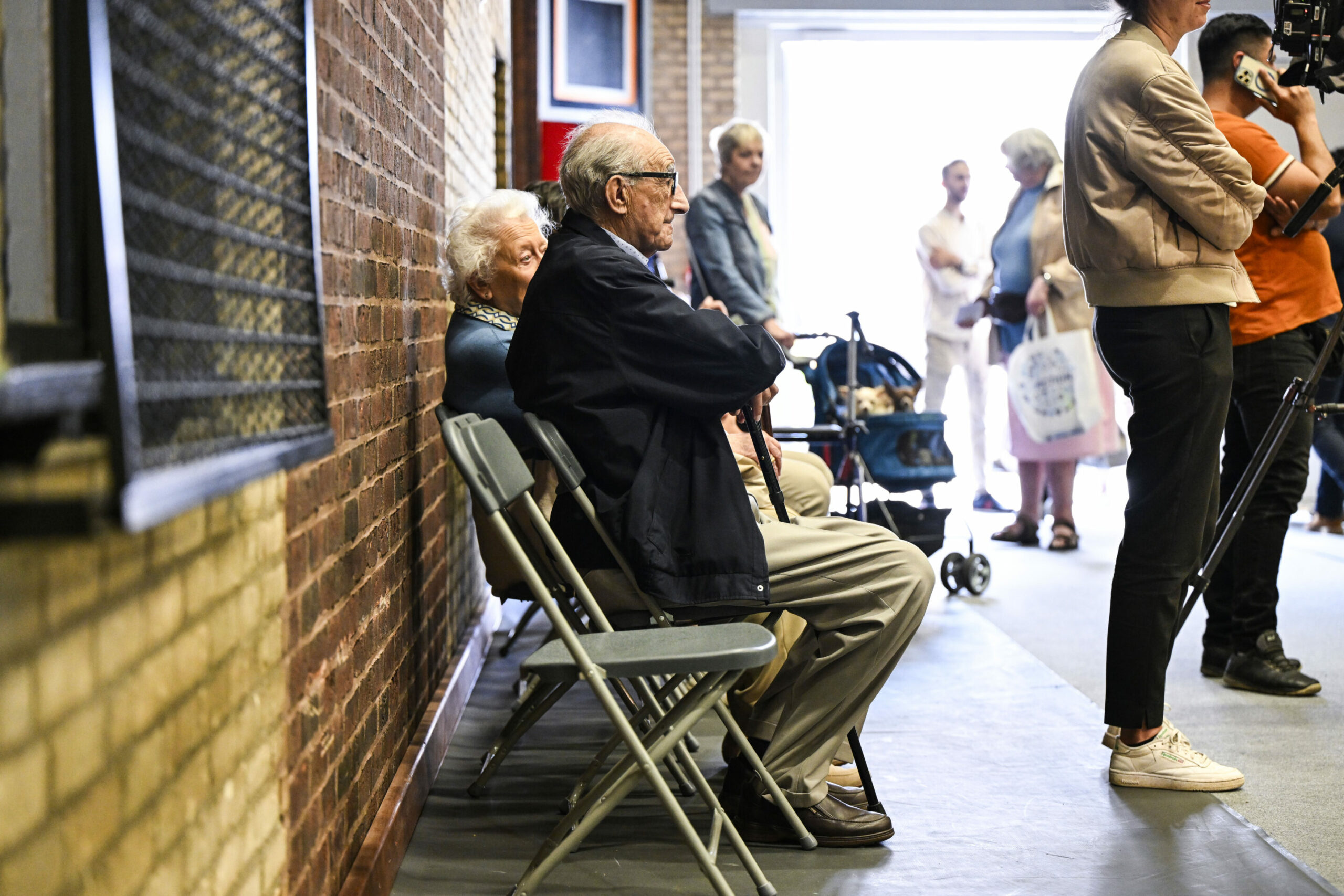
Voters wait at a polling station in Vilvoorde, Sunday 09 June 2024. Credit: Belga / Tom Goyvaerts
Usually, all stations close at 16:00, but they will stay open for longer where necessary so everyone in line can still vote.
Olivier Maingain (DéFi), the mayor of Woluwe-Saint-Lambert will keep some polling stations in his municipality open until 18:00 should the need arise, he confirmed to Bruzz. He added that he has permission of the district's judge to do so.
[15:01] - Nearly everyone in Etterbeek has voted
One hour before voting closes, 480 out of 592 people registered in the polling station in yet another corner of Etterbeek have already cast their vote, according to the municipal worker on duty. She adds that only a very small amount of expats living in the area registered to vote in the European elections, likely opting to vote in their countries of origin rather than in Belgium.
[15:00] - First results from Heist-op-den-Berg in Antwerp
Heist-op-den-Berg, in the province of Antwerp, has released its first results for the Flemish Parliament, VRT NWS reported. The municipality has historically made a point of being the first to pass on its results.
The results for the Flemish Parliament show the separatist N-VA party remains the largest party with 26.8%, (-3.2% since the last elections in 2019), followed by the far-right Vlaams Belang with 26.2% (+3.6%). Flemish socialists Vooruit is in third place with 15.2% (+7.9%). The top three parties are followed by the Flemish Christian Democrats CD&V (11%), PVDA (8.6%) and Open VLD (5.9%) following.
However, VRT NWS stressed this is merely a preliminary result for the Flemish Parliament, as in other communes, votes have not yet been counted.
A man knowingly disconnected an electrical cable that powered voting computers at midday on Sunday at a polling station in the south of Antwerp, the chairman of the local electoral office has confirmed.
"The man in question first voted and then disconnected the power cable. He then started running", according to this president. "All the computers had to be restarted. It took a little while, but everything is back in order".
Enjoyed that? Here is a traditional Flemish voting joke doing the rounds today:
There is a recurring joke Flemish voters traditionally tell each other on election day:
"What did you vote for?" "Op de Goei!" (For the good one!) It's a bit lame — Nassreddin | نصر الدين (@Nassreddin2002) June 9, 2024
[14:00] - Polls closed for paper ballots
All polling stations in Wallonia, and 141 towns and municipalities in Flanders, have closed.
[13:47] - 'Nationalists scare me'
The Brussels Times spoke to voter Stephane (58) who was voting today in Ixelles. He said he voted left, and "according to his conscience".
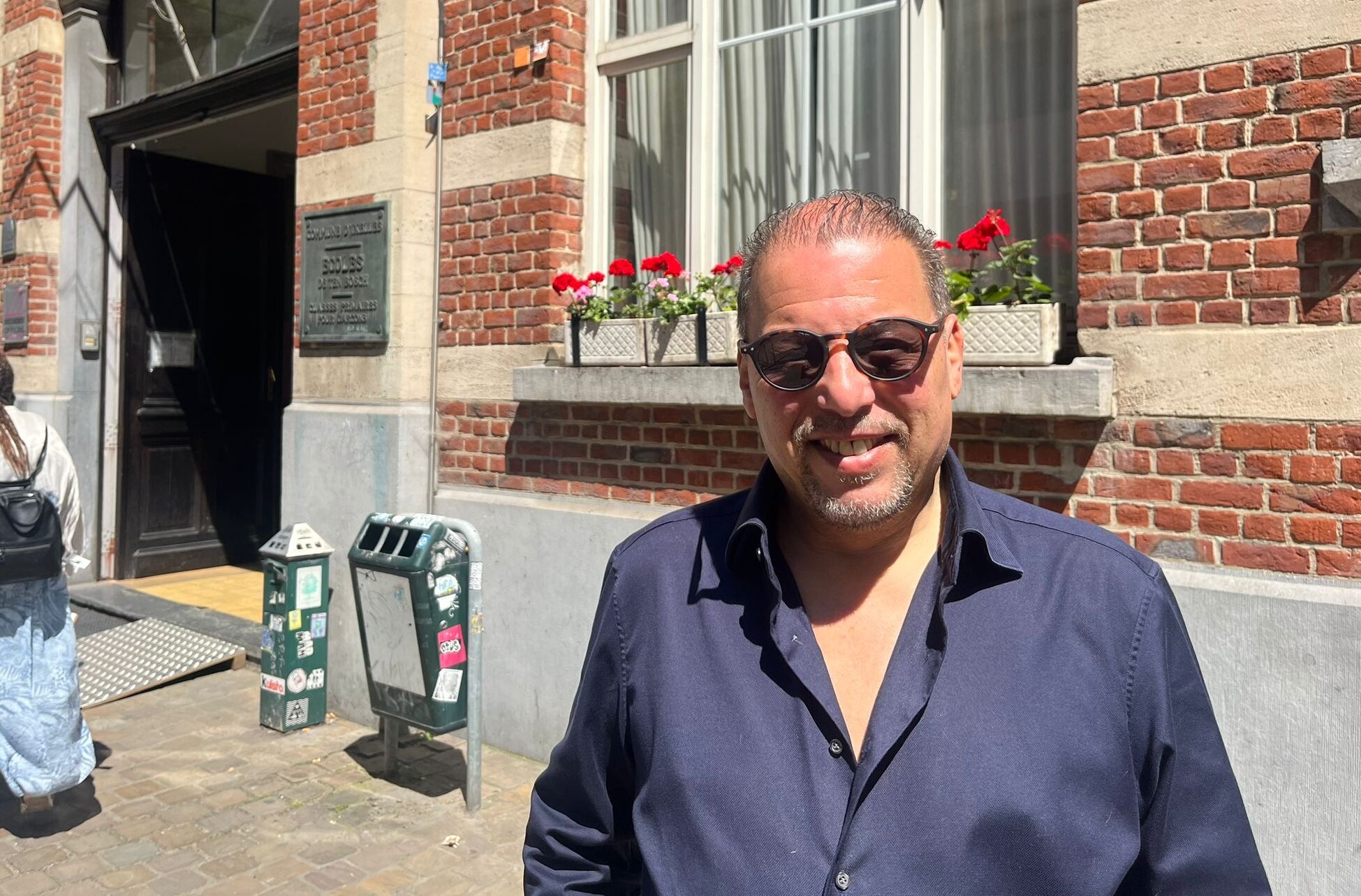
Stephan (58) voter in Ixelles. Sunday 9 June 2024. Credit: The Brussels Times / Ellen O'Regan
"I especially voted to avoid the ones I don’t want. I was a bit disappointed with the selection but I chose the least bad," he said. Stephane said the most important issues to him are fighting racism and discrimination, as well as giving people more support to have a better quality of life. He believes there is “too much capitalism".
"What scares me is the nationalists on the right side, especially in Europe. I’m totally against that." Talking about the Belgian elections, Stephane said it can be hard to vote for a party and then see their promises diluted when they enter a large coalition. "You never know in Belgium when you vote for someone, if they will have to negotiate their ideals with other parties, so that’s a bit strange," he said.
[13:40] - Polling stations close in 20 minutes in Wallonia and some Flemish communes
Not long now until hundreds of polling stations where voting is done on paper close at 14:00 [CEST]. Unlike the rest of the country, almost the entire Walloon region (394 towns and municipalities, not in nine municipalities in the German-speaking Community) still use paper ballots, which take more time to count, so polls close earlier.
In Flanders, paper voting is still done in 141 towns and municipalities, and here too, polls close at 14:00. In the 187 other Flemish towns and communes, including the entire Brussels Region, polling stations will not close until 16:00.
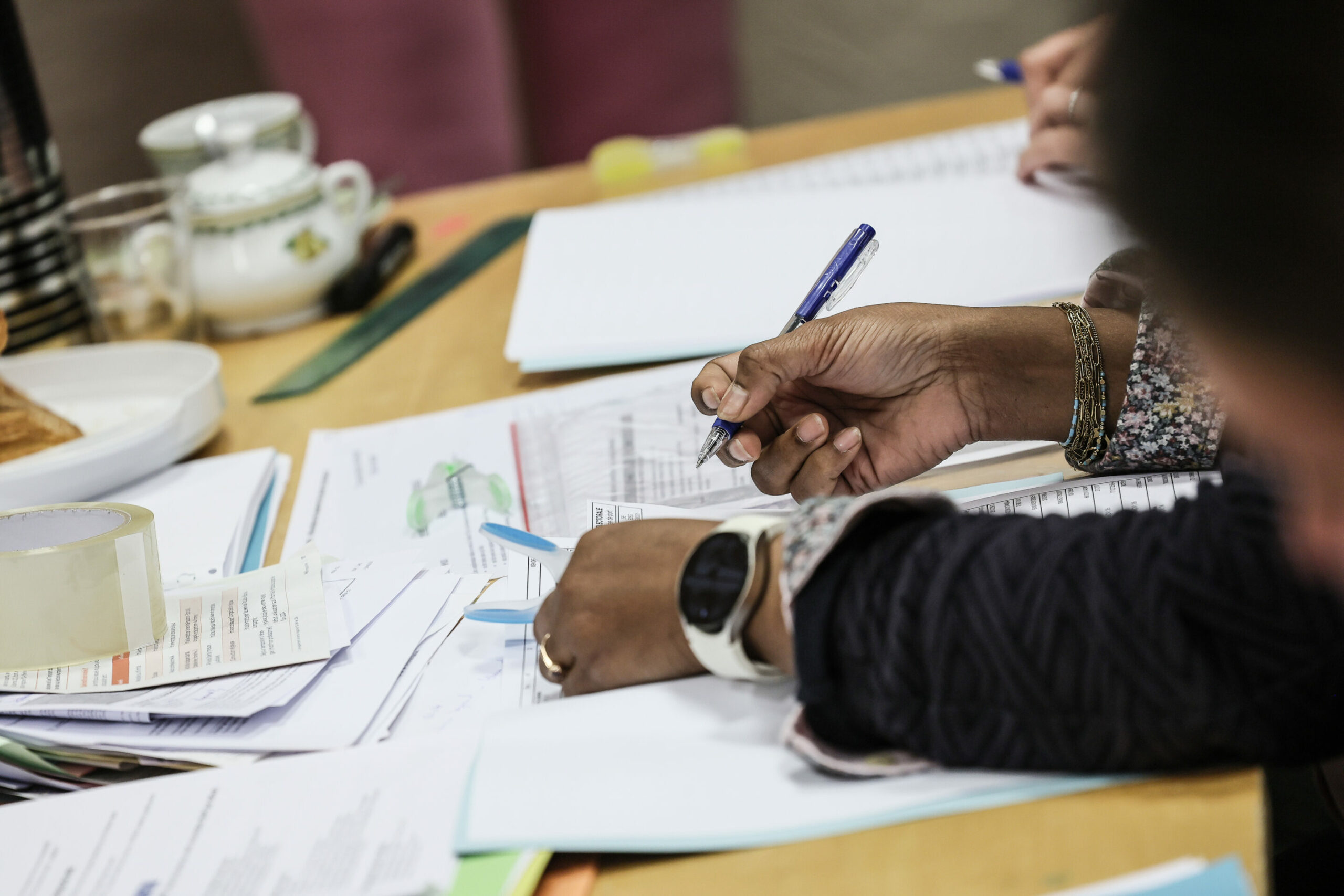
Credit: Belga/ Bruno Fahy
[13:30] – Hedebouw hopeful for a strong showing for the PTB-PVDA
Raoul Hedebouw, the leader of the PTB-PVDA, cast his vote in Liège on Sunday morning. He said afterwards: "The key issue is whether PTB-PVDA will become an essential part of government formation talks... Politics is a matter of balance of power, not individual players. Mainstream parties, especially PS and Ecolo, have shut us out. But if PTB-PVDA is strong enough, we can certainly assert ourselves."
Hoping for a prominent place on the federal level, Hedebouw expressed hopes that his party would "emerge as the third largest parliamentary group in the Chamber." Such a result would mean that the PTB-PVDA "would become inescapable in discussions."
[13:20] – Justice Minister Van Tigchelt can't wait to get back to work
Justice Minister Paul Van Tigchelt (Open Vld) cast his vote in Zoersel, Antwerp province. "If it were up to me, we'd get straight to work. Some matters can't wait," he said afterwards.
In six months, Van Tigchelt transitioned from Chief of Staff to leading candidate for the Flemish liberals in Antwerp province. The new arrival faced his electoral baptism of fire, standing against figures such as Bart De Wever, Meyrem Almaci, Jinnih Beels, Peter Mertens, and Annelies Verlinden.
"I served the country behind the scenes for 20 years," the minister said. "I walk onto the stage today with conviction and a positive spirit." He looked forward to addressing pressing issues: "Several matters can't wait: the fight against organised crime, support for victims of sexual abuse, and improving purchasing power."
[13:25] - Reporter on the ground - Undecided vs steadfast voters
In several municipalities across the Limburg province, many people headed to the polling stations early. Many of those who arrived later than 08:30 had to wait up to an hour before being able to cast their vote — even in the electronic booths.
The Brussels Times reporter Maïthé Chini spoke to several people queuing to cast their vote. One girl, Aylin (29) from Maasmechelen, has been undecided for weeks on what party or candidates to vote for. "To be honest I am still not sure," she told The Brussels Times. "It’s between Vooruit and PTB-PVDA. I’ll decide when I’m in the booth."
Others, such as Leandro (54) and his neighbour Ricardo (56), have known for months who they will be voting for: "Vlaams Belang, it is time all those immigrants stop taking advantage of our social security here."
When asked how they think the far-right party (which has said does not want to govern at the federal level — where the migration competencies are held) will arrange that, the two men said they were sure party leader Tom Van Grieken "would figure something out".
Among first-time voters, many are voting for the Flemish environmentalist Groen party, and cite their strong stance on women’s and LGBTQ rights, as well as the party’s clear position on the Israel-Palestine situation as primary reasons for their choice.
[13:00] - Oldest Belgian woman casts her vote
Belgium's oldest woman Denise Waelbers (108) has also been out on Sunday to cast her vote in Mortsel. She dressed up for the occasion and went to vote with her neighbour Monique, VRT NWS reported.
Her top priorities? Electing politicians who care about the elderly and are concerned about the loneliness of older people. "A lot more money needs to go to the care sector," she said.
[12:55] – Vincent Van Peteghem 'confident' for Sunday and the near future
Vice Prime Minister and Finance Minister Vincent Van Peteghem was upbeat after voting in De Pinte, in East Flanders. He cycled to the polling station with his wife and expressed optimism to Belga News Agency, despite recent unfavourable polls for the Flemish Christian Democrats.
"We ran a good campaign and have strong local forces who understand their municipality and city context. I am confident about today and what lies ahead." He added that in discussions with the public during the campaign, voters "seem to appreciate our political approach... We have executed a clear strategy without deviating from it, catering for the active and retired middle class."
[12:40] - Voter in Etterbeek: "Fairer, not stricter, immigration policies"
The Brussels Times reporter Ciara Carolan is speaking to voters at a polling station in Etterbeek this morning. Ozden, who works in the private sector, didn't disclose which party he voted for, but said he opted for "the candidate who he recognises and trusts will keep their promises".
The forty-something-year-old wants the next government to "safeguard the rights of Belgian citizens in possession of papers" and implement "a more correct approach" to immigration rather than a stricter one, which has been put forward by many parties, including the socialist Vooruit party.
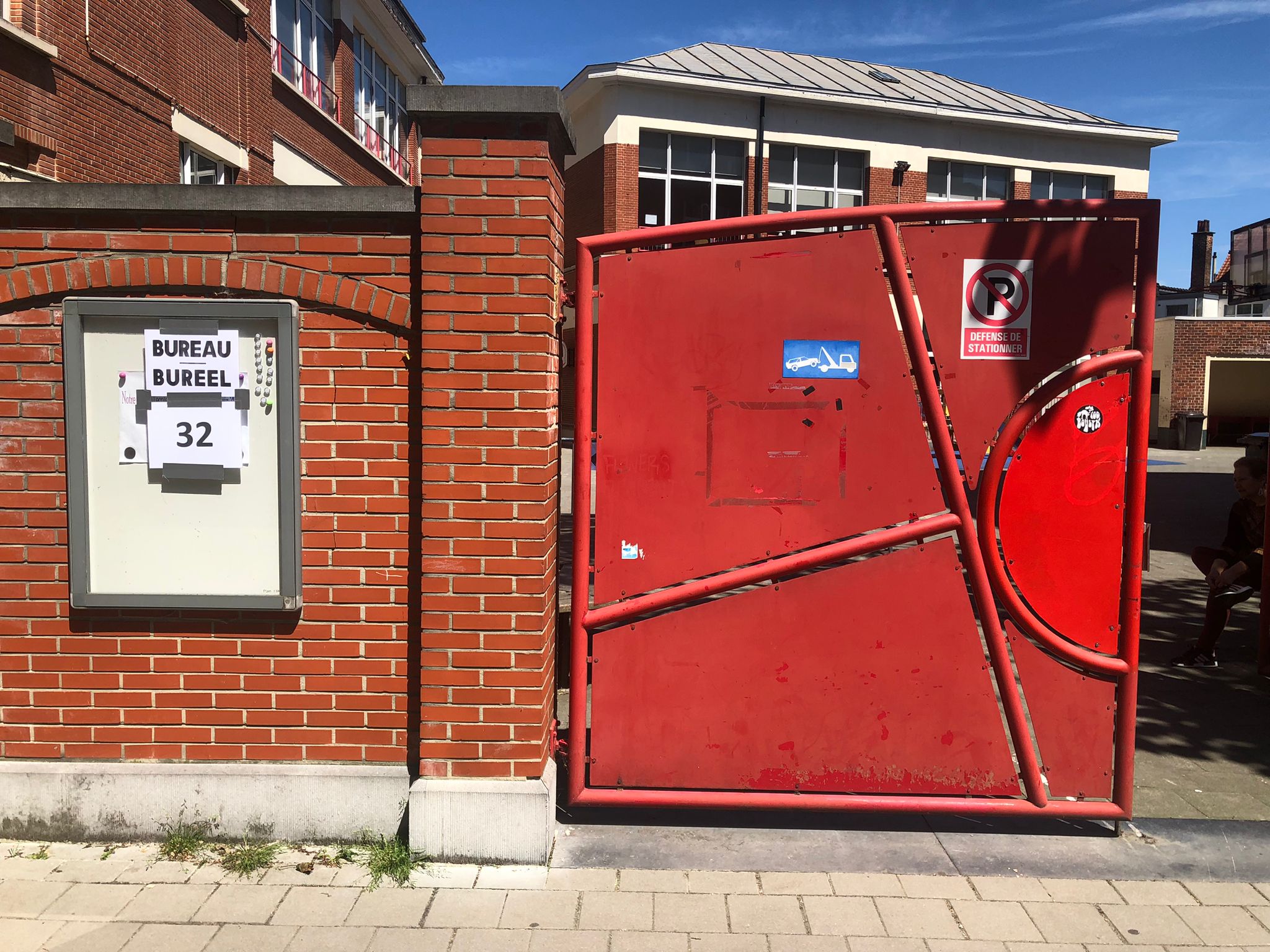
A polling station in Etterbeek. Credit: The Brussels Times
On the topic of the far-right Flemish separatist party Vlaams Belang, Ozden suggests the cordon sanitaire, in place since the late 1980s and now used to ensure no other Flemish party concludes administrative agreements with Vlaams Belangm, creates too many divisions among Belgians. "We all have to work together," he tells The Brussels Times without commenting on Vlaams Belang’s aspirations to cleave Flanders from the rest of the country.
[12:20] - Some minors given option to vote for other elections
Several local media reported that additional issues are popping up, specifically with electoral lists in Flanders, giving some minors (16 and 17-year-olds), who can for the first time in Belgium vote in the European elections, the option to vote for the wrong lists. Young voters in some places have reported that they could also vote for the Flemish Parliament and the Chamber.
Koen Schuyten, spokesperson for the Ministry of Home Affairs, told VRT NWS could not confirm these reports as votes have to remain anonymous. He did say these were exceptional human errors and that there are no system issues. However, as these votes cannot be viewed for reasons of anonymity, they cannot be removed from the count.
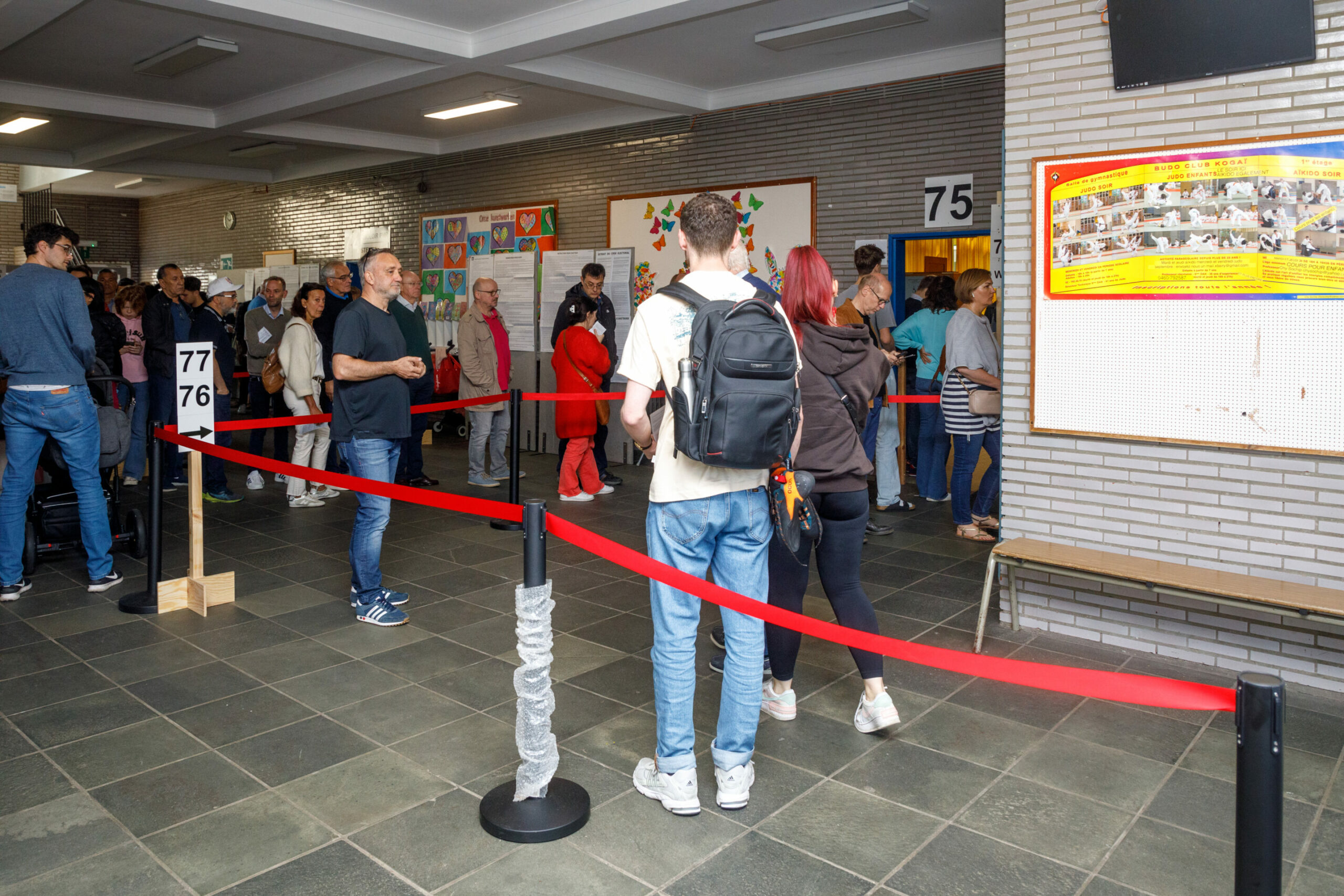
Some young people have reportedly been given the option to vote for the wrong ballots. Credit: Belga/ Hatim Kaghat
[11:50] - Our reporter on the ground
The Brussels Times reporters Ellen O'Regan and Ciara Carolan are out speaking to voters at polling stations in Brussels. Long queues were seen early this morning outside École Peter Pan in Saint-Gilles, where locals are ready to cast votes.
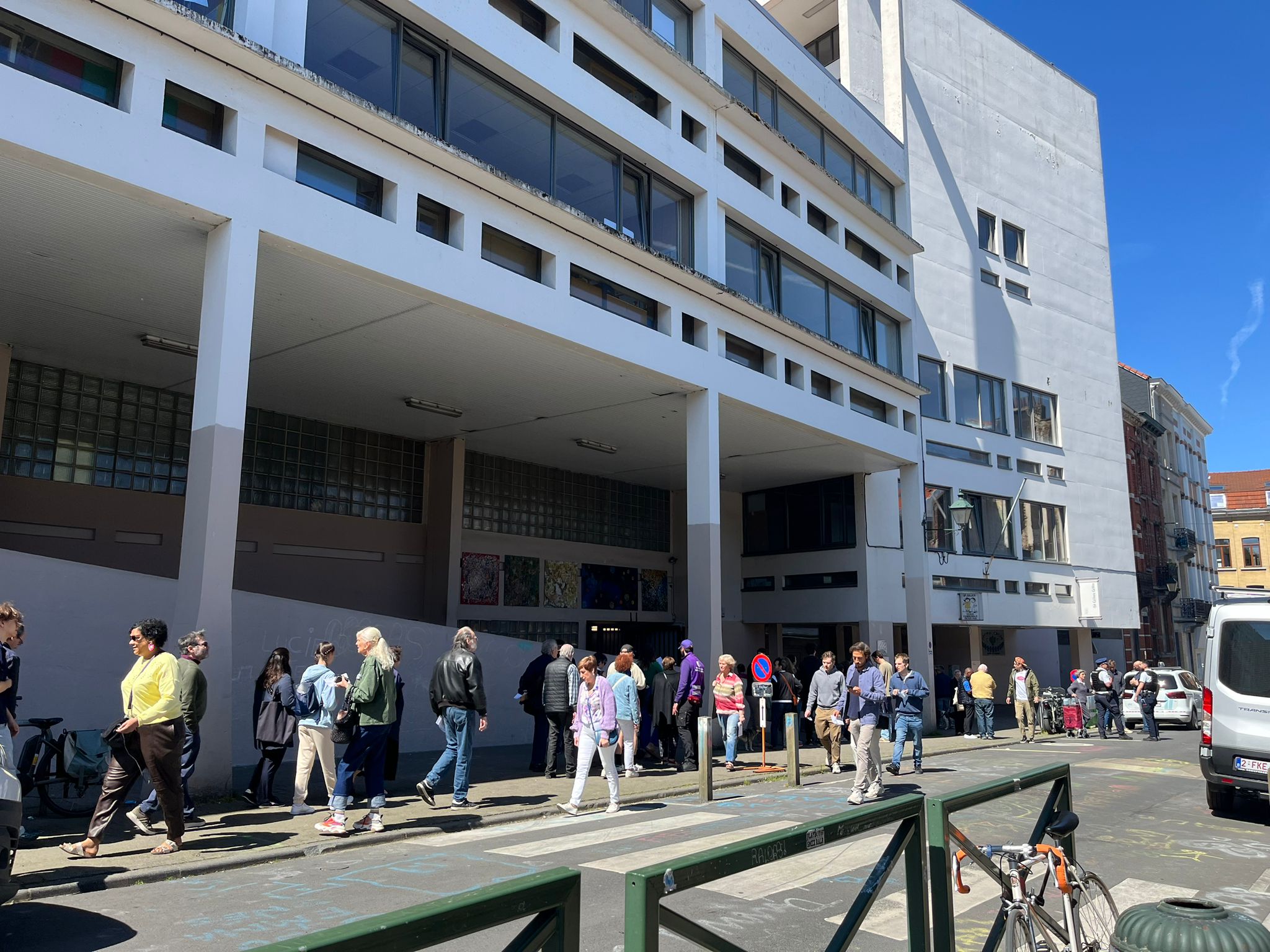
Credit: The Brussels Times
[11:30] Elio Di Rupo makes mistake while voting: 'I put on the wrong glasses'
The outgoing Walloon Minister-President and leading PS candidate for European elections Elio Di Rupo cast his vote at around 10:00 on Sunday at Mons City Hall.
He was forced to leave his polling booth to request a new ballot paper for the Chamber. "I had put on my wrong glasses and there are a lot of candidates, so I made a mistake," said the PS veteran, who had to return his faulty ballot paper to officials at the polling station.
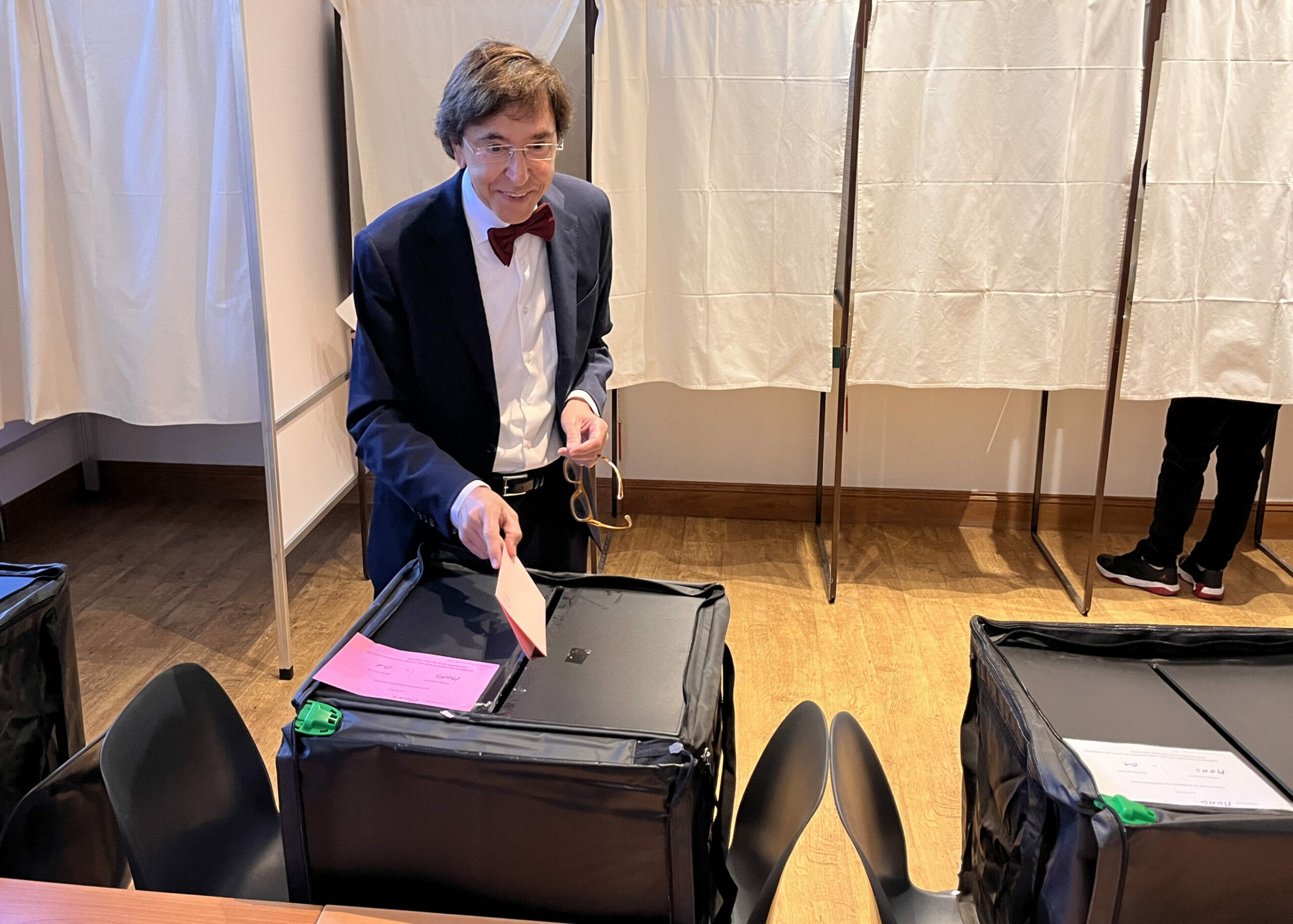
Walloon Minister-President Elio Di Rupo casts his vote at a polling station in Mons. Credit: Belga/ Eric Cornu
[11:20] - Wobbly start in some polling stations
Shortly after 08:00, problems surfaced at some polling stations. Technical issues were reported with 32 of the 4,207 presidents' computers and 199 of the 25,000 voting computers. About four hundred technicians were sent out where the disturbance was greatest. Most issues were resolved by around 10:15, but nine polling stations remained closed.
However, most polling stations have been open for more than three hours without problems, with many people getting up early to cast their votes. This includes several key members of Belgium's political parties, such as Jeremie Vaneeckhout, list leader for the Flemish elections for the Green party Groen, far-right Vlaams Belang chair Tom Van Grieken, former leader of the Flemish socialist Vooruit party, Conner Rousseau, and current Prime Minister Alexander De Croo (Open VLD) who took his family to the polling station.
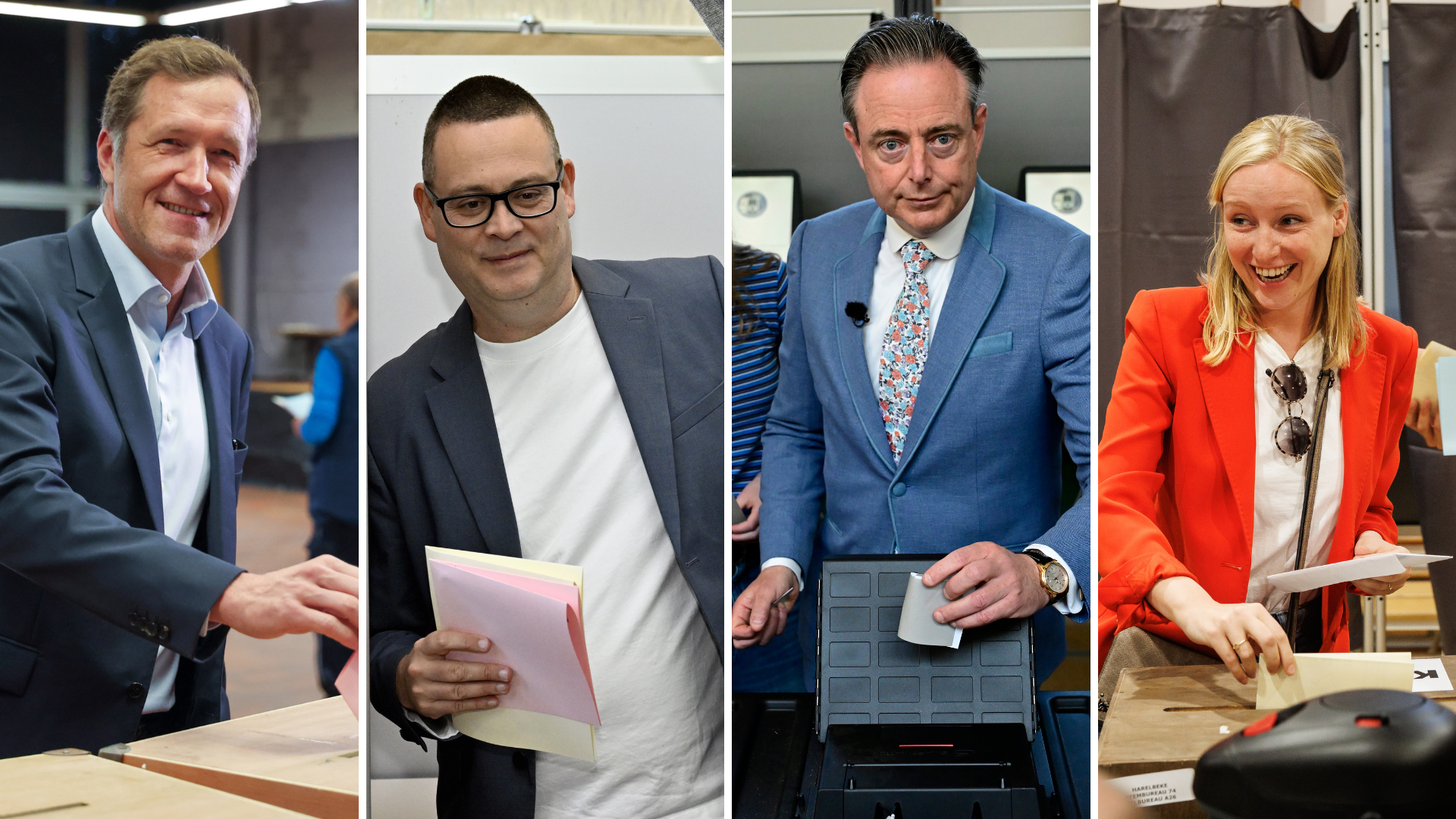
From left to right: PS chair Paul Magnette, PTB-PVDA chair Raoul Hedebouw, N-Va chair Bart De Wever and Vooruit chair Melissa Depraetere casting their votes on Sunday morning. Credit: Belga
Belgium's King Philippe and Queen Mathilde won’t be voting today, as they are expected to remain politically neutral. All other members of the royal family, including their four children – Crown Princess Elisabeth (22), Prince Gabriël (20) and Prince Emmanuel (18) – are obliged to vote in all elections. Princess Eléonore (16) is obliged to vote in the European elections. Former King Albert (90) is also expected to vote in Laeken on Sunday.
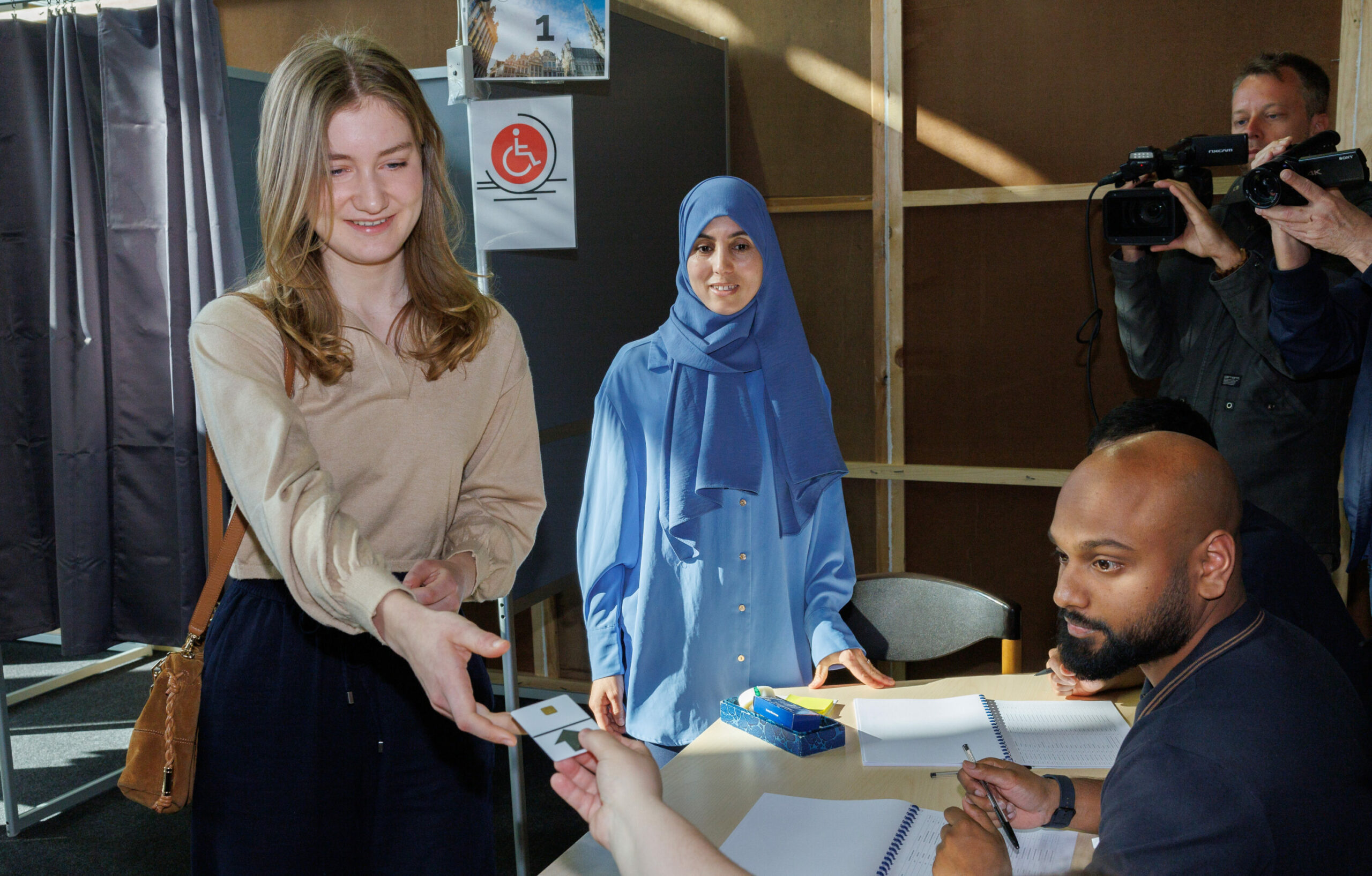
Crown Princess Elisabeth casts her vote at a polling station in Laeken. Credit: Belga/ Benoit Doppagne
[10:30] - Understanding elections in Belgium
Belgian voters will elect 22 Belgian MEPs to the European Parliament (of the 705 total). Of the 22 MEPs, 13 will be allocated to candidates in the Dutch language community – one more than in the 2019 European election. The French-speaking electoral college has eight MEPs; one MEP is elected by the German-speaking electoral college.
In the Belgian national elections, 124 MPs will be elected in Flanders (including 6 from Brussels), 89 in Brussels (including 17 Dutch speakers), 75 in Wallonia, and 25 to the German Community Parliament.
Polling stations opened at 08:00 across Belgium and will remain open until 16:00, or until 14:00 in municipalities where voting is not yet done electronically. You can find out how a valid vote is cast here. Not sure who to vote for? Read everything about the parties on the various ballots here.
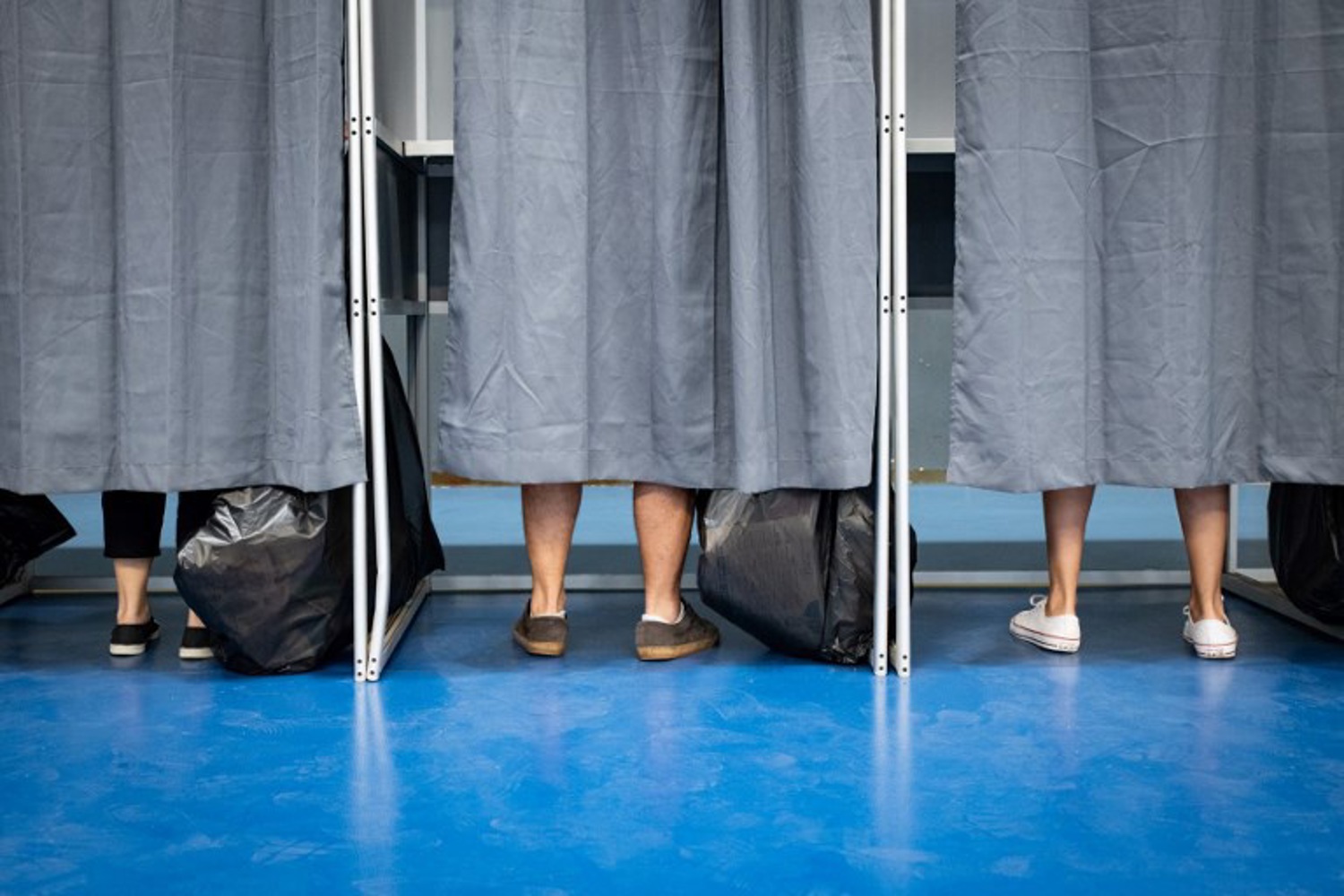
First people out voting on Sunday morning. Credit: Belga

